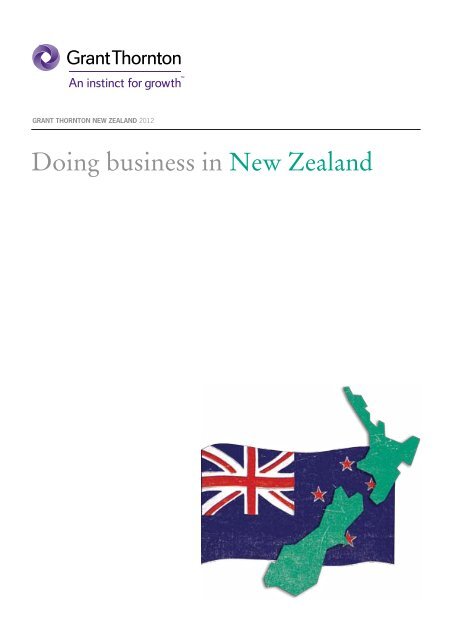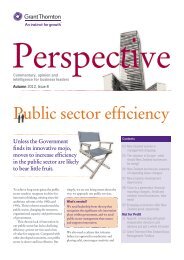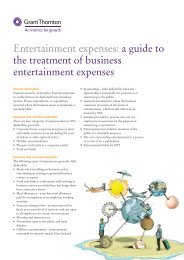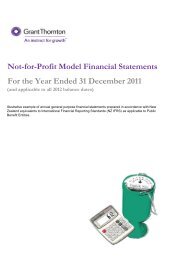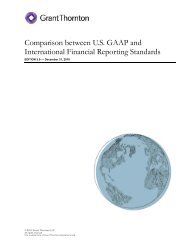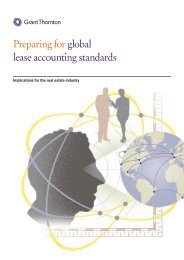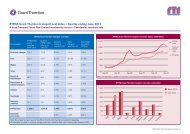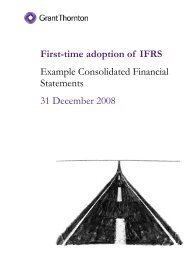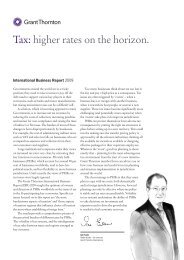Doing business in New Zealand - Grant Thornton
Doing business in New Zealand - Grant Thornton
Doing business in New Zealand - Grant Thornton
Create successful ePaper yourself
Turn your PDF publications into a flip-book with our unique Google optimized e-Paper software.
<strong>Grant</strong> <strong>Thornton</strong> <strong>New</strong> <strong>Zealand</strong> 2012<br />
<strong>Do<strong>in</strong>g</strong> <strong>bus<strong>in</strong>ess</strong> <strong>in</strong> <strong>New</strong> <strong>Zealand</strong>
Contents<br />
3 Foreword<br />
4 Country profile<br />
6 Regulatory environment<br />
8 F<strong>in</strong>ance and bank<strong>in</strong>g<br />
9 Imports<br />
10 Bus<strong>in</strong>ess entities<br />
12 Labour<br />
15 F<strong>in</strong>ancial report<strong>in</strong>g and audit<br />
18 Tax<br />
<strong>Do<strong>in</strong>g</strong> <strong>bus<strong>in</strong>ess</strong> <strong>in</strong> <strong>New</strong> <strong>Zealand</strong> 2
Foreword<br />
If you are plann<strong>in</strong>g on<br />
do<strong>in</strong>g <strong>bus<strong>in</strong>ess</strong> <strong>in</strong> <strong>New</strong><br />
<strong>Zealand</strong> knowledge of the<br />
<strong>in</strong>vestment environment<br />
and <strong>in</strong>formation on the<br />
legal, account<strong>in</strong>g and<br />
taxation framework are<br />
essential to keep you on<br />
the right track…<br />
<strong>New</strong> <strong>Zealand</strong> is a relatively small<br />
trad<strong>in</strong>g market <strong>in</strong> world terms. It<br />
welcomes foreign <strong>in</strong>vestment<br />
and is a relatively easy country <strong>in</strong><br />
which to do <strong>bus<strong>in</strong>ess</strong>. Nevertheless, it<br />
is essential that prospective <strong>in</strong>vestors<br />
obta<strong>in</strong> advice concern<strong>in</strong>g regulatory,<br />
legal and cultural issues aris<strong>in</strong>g from the<br />
conduct of <strong>bus<strong>in</strong>ess</strong> <strong>in</strong> <strong>New</strong> <strong>Zealand</strong>.<br />
<strong>Grant</strong> <strong>Thornton</strong> has prepared this<br />
guide to assist those <strong>in</strong>terested <strong>in</strong> do<strong>in</strong>g<br />
<strong>bus<strong>in</strong>ess</strong> <strong>in</strong> <strong>New</strong> <strong>Zealand</strong>. It <strong>in</strong>cludes<br />
legislation <strong>in</strong> force as of 1 August<br />
2012. The guide does not cover the<br />
subject exhaustively but is <strong>in</strong>tended to<br />
answer some of the important, broad<br />
questions that may arise. When specific<br />
problems occur <strong>in</strong> practice, it will<br />
often be necessary to refer to the laws<br />
and regulations of <strong>New</strong> <strong>Zealand</strong> and<br />
to obta<strong>in</strong> appropriate account<strong>in</strong>g and<br />
legal advice. If you require any further<br />
<strong>in</strong>formation, please do not hesitate to<br />
contact your nearest <strong>Grant</strong> <strong>Thornton</strong><br />
<strong>New</strong> Zeland office, details of which are<br />
noted on the back cover.<br />
<strong>Grant</strong> <strong>Thornton</strong> International<br />
<strong>Grant</strong> <strong>Thornton</strong> International is one<br />
of the world’s lead<strong>in</strong>g organisations<br />
of <strong>in</strong>dependently owned and managed<br />
account<strong>in</strong>g and consult<strong>in</strong>g firms,<br />
provid<strong>in</strong>g assurance, tax and specialist<br />
advice to privately held <strong>bus<strong>in</strong>ess</strong>es and<br />
public <strong>in</strong>terest entities.<br />
Member firms focus on help<strong>in</strong>g<br />
<strong>bus<strong>in</strong>ess</strong>es reach their commercial goals<br />
by provid<strong>in</strong>g practical, customised<br />
solutions and identify<strong>in</strong>g and pursu<strong>in</strong>g<br />
<strong>bus<strong>in</strong>ess</strong> opportunities domestically<br />
and <strong>in</strong>ternationally. They share a<br />
commitment to provid<strong>in</strong>g the same high<br />
quality service to their clients wherever<br />
they choose to do <strong>bus<strong>in</strong>ess</strong>.<br />
<strong>Grant</strong> <strong>Thornton</strong> International and<br />
member firms are not a worldwide<br />
partnership. Services are delivered<br />
<strong>in</strong>dependently by member firms with<strong>in</strong><br />
<strong>Grant</strong> <strong>Thornton</strong> International, a<br />
non-practic<strong>in</strong>g, <strong>in</strong>ternational umbrella<br />
organisation that does not deliver<br />
services <strong>in</strong> it own name.<br />
<strong>Grant</strong> <strong>Thornton</strong> <strong>New</strong> <strong>Zealand</strong><br />
<strong>Grant</strong> <strong>Thornton</strong> <strong>New</strong> <strong>Zealand</strong> is a<br />
major firm of chartered accountants<br />
with offices <strong>in</strong> the three ma<strong>in</strong><br />
centres of Auckland, Well<strong>in</strong>gton and<br />
Christchurch.<br />
As a member firm of <strong>Grant</strong><br />
<strong>Thornton</strong> International we are able to<br />
comb<strong>in</strong>e the knowledge and experience<br />
of our local marketplace with the<br />
technologies, methodologies and<br />
specialist resources of a professional<br />
services organisation at the forefront of<br />
the global account<strong>in</strong>g profession.<br />
Our policy is to provide a high<br />
quality and partner-led service that is<br />
tailored to the client’s needs wherever<br />
the client operates. Our client service<br />
teams comprise professionals with the<br />
requisite skills to deliver practical and<br />
cost effective <strong>bus<strong>in</strong>ess</strong> solutions.<br />
Our range of services <strong>in</strong>cludes:<br />
• Account<strong>in</strong>g and <strong>bus<strong>in</strong>ess</strong> advisory<br />
• Assurance and <strong>in</strong>ternal audit<br />
• Bus<strong>in</strong>ess risk services<br />
• Bus<strong>in</strong>ess transformation<br />
• Corporate f<strong>in</strong>ance<br />
• Government advisory<br />
• Recovery and reorganisation<br />
• Tax compliance and advice<br />
• Transaction services<br />
• Wealth management<br />
• Other specialist services such<br />
as litigation support, forensic<br />
account<strong>in</strong>g and <strong>in</strong>dependent reports<br />
<strong>Do<strong>in</strong>g</strong> <strong>bus<strong>in</strong>ess</strong> <strong>in</strong> <strong>New</strong> <strong>Zealand</strong> 3
Country profile<br />
Geography and population<br />
<strong>New</strong> <strong>Zealand</strong> is situated <strong>in</strong> the South<br />
Pacific Ocean, approximately 1,500<br />
kilometres east of Australia. It covers<br />
an area of 270,000 sq km (similar <strong>in</strong><br />
size to the British Isles) and comprises<br />
two ma<strong>in</strong> islands, the North Island<br />
and South Island. The landscape is<br />
varied and often spectacular, which<br />
makes <strong>New</strong> <strong>Zealand</strong> a popular tourist<br />
dest<strong>in</strong>ation.<br />
<strong>New</strong> <strong>Zealand</strong>’s population is around<br />
4.4 million. About three-quarters of<br />
<strong>New</strong> <strong>Zealand</strong>ers live <strong>in</strong> the North<br />
Island and about half live <strong>in</strong> the four<br />
largest cities of Auckland, Christchurch,<br />
Well<strong>in</strong>gton, and Hamilton.<br />
<strong>New</strong> <strong>Zealand</strong> is a multi-ethnic<br />
country, compris<strong>in</strong>g around 68% of<br />
people of European descent, 15%<br />
Maori (tangata whenua, the <strong>in</strong>digenous<br />
people), 10% Asian and 7% Pacific<br />
peoples. This ethnic diversity is<br />
projected to <strong>in</strong>crease, with the Asian<br />
population <strong>in</strong> particular <strong>in</strong>creas<strong>in</strong>g to<br />
14% over the next 15 years.<br />
Political system<br />
<strong>New</strong> <strong>Zealand</strong> is a constitutional<br />
monarchy with Queen Elizabeth II<br />
as its sovereign head of state. <strong>New</strong><br />
<strong>Zealand</strong> does not have a constitution<br />
that is embodied <strong>in</strong> a s<strong>in</strong>gle document<br />
or Act of Parliament, but rather the<br />
constitutional law is conta<strong>in</strong>ed <strong>in</strong> a<br />
mixture of legislation, the Treaty of<br />
Waitangi, case law and unwritten<br />
conventions hav<strong>in</strong>g their orig<strong>in</strong>s <strong>in</strong><br />
English law.<br />
Constitutional power is vested <strong>in</strong> the<br />
Crown, represented by the Governor-<br />
General. All legislation that is approved<br />
by Parliament must receive Royal<br />
Assent from the Governor-General <strong>in</strong><br />
order to be given legal effect.<br />
Legislative power is vested<br />
<strong>in</strong> a parliamentary system with<br />
representatives (Members of<br />
Parliament) elected every three years<br />
to one central government. S<strong>in</strong>ce<br />
1996, <strong>New</strong> <strong>Zealand</strong> has used the<br />
mixed member proportional (MMP)<br />
representation vot<strong>in</strong>g system. The<br />
National Party leads the present<br />
Government, with support from ACT,<br />
United Future, and the Maori Party.<br />
Executive power is exercised by<br />
the Cab<strong>in</strong>et, formed by the party<br />
that controls the majority of votes <strong>in</strong><br />
Parliament. Cab<strong>in</strong>et is led by the Prime<br />
M<strong>in</strong>ister (currently John Key), who is<br />
traditionally the leader of the govern<strong>in</strong>g<br />
party or coalition.<br />
Legal system<br />
The legal system is based upon common<br />
law and statute. <strong>New</strong> <strong>Zealand</strong>’s<br />
common law has developed from and<br />
is reliant upon English law pr<strong>in</strong>ciples.<br />
However, many common law pr<strong>in</strong>ciples<br />
have been codified by statute.<br />
The court system is hierarchical.<br />
Trials are conducted <strong>in</strong> either the<br />
District Court (the lower jurisdiction)<br />
or the High Court. Appeals may be<br />
made to the Court of Appeal and,<br />
with leave, to the Supreme Court. A<br />
Disputes Tribunal is available as a lowcost<br />
alternative for settl<strong>in</strong>g small claims.<br />
Language<br />
English is one of <strong>New</strong> <strong>Zealand</strong>’s two<br />
official languages, and is universally<br />
spoken. The other official language is<br />
Maori (Te Reo).<br />
Bus<strong>in</strong>ess hours/time zone<br />
Normal <strong>bus<strong>in</strong>ess</strong> hours are 8.30am<br />
to 5.00pm Monday to Friday. Many<br />
retailers are also open on weekends<br />
and one or more even<strong>in</strong>gs. Trad<strong>in</strong>g<br />
is permitted on all days, with the<br />
exception of Good Friday, Easter<br />
Sunday, Christmas Day and until<br />
1.00pm on Anzac Day (25 April).<br />
Certa<strong>in</strong> <strong>bus<strong>in</strong>ess</strong>es are exempt from<br />
these restrictions. Bank<strong>in</strong>g hours are<br />
normally 9.00am to 4.30pm Monday to<br />
Friday, but retail branches are open <strong>in</strong><br />
the weekends <strong>in</strong> all large retail shopp<strong>in</strong>g<br />
centres.<br />
<strong>New</strong> <strong>Zealand</strong>’s time zone is GMT<br />
+12 hours and +18 hours US Eastern<br />
Standard Time. <strong>New</strong> <strong>Zealand</strong> adopts<br />
daylight sav<strong>in</strong>g dur<strong>in</strong>g the summer<br />
months, from the last Sunday <strong>in</strong><br />
September until the first Sunday <strong>in</strong><br />
April.<br />
Public holidays<br />
<strong>New</strong> <strong>Zealand</strong> public holidays are as<br />
follows:<br />
• <strong>New</strong> Year - 1 and 2 January<br />
• Waitangi Day - 6 February<br />
• Good Friday<br />
• Easter Monday<br />
• Anzac Day - 25 April<br />
<strong>Do<strong>in</strong>g</strong> <strong>bus<strong>in</strong>ess</strong> <strong>in</strong> <strong>New</strong> <strong>Zealand</strong> 4
• Queen’s Birthday - 1st Monday <strong>in</strong><br />
June<br />
• Labour Day - 4th Monday <strong>in</strong><br />
October<br />
• Christmas – 25 & 26 December<br />
• Prov<strong>in</strong>cial Anniversary Day - varies<br />
between prov<strong>in</strong>ces across the country<br />
Economy<br />
<strong>New</strong> <strong>Zealand</strong> has a relatively<br />
deregulated and open economy. It is<br />
consistently ranked as one of the easiest<br />
countries <strong>in</strong> which to do <strong>bus<strong>in</strong>ess</strong>, one<br />
of the least corrupt, and hav<strong>in</strong>g one of<br />
the highest levels of economic freedom.<br />
Major <strong>in</strong>dustries <strong>in</strong>clude agriculture,<br />
forestry, fish<strong>in</strong>g, horticulture,<br />
manufactured goods (<strong>in</strong>clud<strong>in</strong>g food<br />
process<strong>in</strong>g).<br />
Major imports <strong>in</strong>clude m<strong>in</strong>eral fuels,<br />
mechanical and electrical mach<strong>in</strong>ery,<br />
vehicles, pharmaceuticals, textiles, and<br />
plastics.<br />
Major exports <strong>in</strong>clude dairy<br />
products, meat, wood, m<strong>in</strong>eral fuels,<br />
mach<strong>in</strong>ery, fruit and nuts, w<strong>in</strong>e,<br />
fish, wool, horticultural produce,<br />
manufactured goods and tourism.<br />
Pr<strong>in</strong>cipal trad<strong>in</strong>g partner<br />
Exports:<br />
• Australia<br />
• Ch<strong>in</strong>a<br />
• USA<br />
• Japan<br />
• Korea<br />
• Europe<br />
• Southeast Asia<br />
Imports:<br />
• Australia<br />
• Ch<strong>in</strong>a<br />
• USA<br />
• Japan<br />
• Europe<br />
• Southeast Asia<br />
<strong>New</strong> <strong>Zealand</strong> is a proponent of free<br />
trade and is an active member of the<br />
World Trade Organisation (WTO). It<br />
has completed free trade agreements<br />
with ASEAN/Australia, Ch<strong>in</strong>a and<br />
Malaysia, and is presently negotiat<strong>in</strong>g<br />
agreements with India, Russia-Belarus-<br />
Kazakhstan, the Gulf Cooperation<br />
Council and Korea. It has special<br />
trad<strong>in</strong>g relationships with Australia<br />
(CER), Hong Kong (CEP), Thailand<br />
(CEP) and S<strong>in</strong>gapore (CEP), and is a<br />
member of the Trans-Pacific Strategic<br />
Economic Partnership (P4).<br />
Cost of liv<strong>in</strong>g<br />
One of the greatest attractions of <strong>New</strong><br />
<strong>Zealand</strong> is the lifestyle it has to offer.<br />
Not only do Kiwis seem to enjoy a<br />
more relaxed liv<strong>in</strong>g philosophy but<br />
compared with many countries, an<br />
enjoyable lifestyle seems to be more<br />
obta<strong>in</strong>able. Auckland and Well<strong>in</strong>gton<br />
generally rank high on <strong>in</strong>ternational<br />
livability measures but the cost of liv<strong>in</strong>g<br />
has also <strong>in</strong>creased.<br />
The cost of liv<strong>in</strong>g varies with<strong>in</strong><br />
<strong>New</strong> <strong>Zealand</strong>, particularly the cost of<br />
hous<strong>in</strong>g. Auckland is a more expensive<br />
city <strong>in</strong> which to live and, follow<strong>in</strong>g the<br />
earthquakes <strong>in</strong> Christchurch, there is a<br />
hous<strong>in</strong>g shortage <strong>in</strong> that city.<br />
Visas<br />
Visitors from many countries do not<br />
require a visa for visits of less than three<br />
months to <strong>New</strong> <strong>Zealand</strong>. Generally,<br />
visitors are not allowed to work here.<br />
However, visas or work permits are<br />
available under various categories for<br />
people wish<strong>in</strong>g to work <strong>in</strong> <strong>New</strong> <strong>Zealand</strong><br />
either on a temporary or permanent<br />
basis. Australian citizens and permanent<br />
residents do not need a work visa to<br />
work <strong>in</strong> <strong>New</strong> <strong>Zealand</strong>.<br />
Long-term visas are available for<br />
migrants br<strong>in</strong>g<strong>in</strong>g valuable skills or<br />
qualifications, sett<strong>in</strong>g up a <strong>bus<strong>in</strong>ess</strong>, or<br />
mak<strong>in</strong>g a f<strong>in</strong>ancial <strong>in</strong>vestment <strong>in</strong> <strong>New</strong><br />
<strong>Zealand</strong>. There are also opportunities<br />
for family reunification by allow<strong>in</strong>g<br />
residents and citizens to sponsor family<br />
members for residence.<br />
For more <strong>in</strong>formation visit:<br />
www.immigration.govt.nz<br />
<strong>Do<strong>in</strong>g</strong> <strong>bus<strong>in</strong>ess</strong> <strong>in</strong> <strong>New</strong> <strong>Zealand</strong> 5
Regulatory environment<br />
Restrictions on foreign ownership<br />
<strong>New</strong> <strong>Zealand</strong> encourages foreign<br />
<strong>in</strong>vestment; nevertheless, consent<br />
is required for certa<strong>in</strong> categories of<br />
<strong>in</strong>vestment <strong>in</strong> <strong>New</strong> <strong>Zealand</strong> by overseas<br />
persons. This process is adm<strong>in</strong>istered<br />
by the Overseas Investment Office<br />
(OIO) on behalf of the government.<br />
The general categories for which OIO<br />
consent is required are <strong>in</strong>vestment <strong>in</strong>:<br />
• ‘sensitive’ land<br />
• <strong>bus<strong>in</strong>ess</strong> assets worth more than $100<br />
million<br />
• fish<strong>in</strong>g quota.<br />
For these purposes, overseas persons<br />
comprise <strong>in</strong>dividuals who are not<br />
<strong>New</strong> <strong>Zealand</strong> citizens and are not<br />
ord<strong>in</strong>arily resident <strong>in</strong> <strong>New</strong> <strong>Zealand</strong>, and<br />
companies that are either <strong>in</strong>corporated<br />
outside <strong>New</strong> <strong>Zealand</strong> or have 25% or<br />
more foreign ownership.<br />
For more <strong>in</strong>formation visit:<br />
www.l<strong>in</strong>z.govt.nz/overseas-<strong>in</strong>vestment<br />
Government approvals and<br />
registration<br />
Most <strong>bus<strong>in</strong>ess</strong>es require no<br />
Government approval. Overseas<br />
companies carry<strong>in</strong>g on <strong>bus<strong>in</strong>ess</strong> <strong>in</strong><br />
<strong>New</strong> <strong>Zealand</strong> and large 1 <strong>New</strong> <strong>Zealand</strong><br />
companies that have 25% or greater<br />
foreign ownership must register and file<br />
audited accounts with the Registrar of<br />
Companies. These f<strong>in</strong>ancial statements<br />
are filed on public record and can be<br />
viewed at: www.<strong>bus<strong>in</strong>ess</strong>.govt.nz<br />
Competition rules<br />
The Commerce Commission is<br />
<strong>New</strong> <strong>Zealand</strong>’s primary competition<br />
enforcement and regulatory agency.<br />
It is an <strong>in</strong>dependent Crown entity<br />
established by the Commerce Act 1986<br />
and its role is to monitor commercial<br />
activity <strong>in</strong> <strong>New</strong> <strong>Zealand</strong> <strong>in</strong> order<br />
to ensure a competitive commercial<br />
environment.<br />
The Commerce Act 1986 aims to<br />
promote competition <strong>in</strong> <strong>New</strong> <strong>Zealand</strong><br />
markets. It prohibits conduct that<br />
restricts competition (restrictive<br />
trade practices) and the purchase of<br />
a <strong>bus<strong>in</strong>ess</strong>’s shares or assets if that<br />
purchase is likely to lead to a substantial<br />
lessen<strong>in</strong>g of competition <strong>in</strong> that market.<br />
Practices specifically prohibited <strong>in</strong>clude:<br />
• Arrangements hav<strong>in</strong>g a purpose<br />
or likely effect of lessen<strong>in</strong>g market<br />
competition (<strong>in</strong>clud<strong>in</strong>g price fix<strong>in</strong>g<br />
and resale price ma<strong>in</strong>tenance)<br />
• Tak<strong>in</strong>g advantage of a substantial<br />
degree of market power to restrict<br />
entry to that market, or elim<strong>in</strong>ate or<br />
deter other market competitors<br />
The Act also provides for the<br />
imposition of control, <strong>in</strong>clud<strong>in</strong>g<br />
pric<strong>in</strong>g control over goods and services<br />
supplied <strong>in</strong> non-competitive markets.<br />
Consumer protection<br />
The Fair Trad<strong>in</strong>g Act 1986 was<br />
developed with the Commerce Act to<br />
encourage competition and to protect<br />
consumers from mislead<strong>in</strong>g and<br />
deceptive conduct and unfair trad<strong>in</strong>g<br />
practices. The Act applies to all aspects<br />
of the promotion and sale of goods<br />
and services – from advertis<strong>in</strong>g and<br />
pric<strong>in</strong>g to sales techniques and f<strong>in</strong>ance<br />
agreements.<br />
Other consumer protection legislation<br />
<strong>in</strong>cludes:<br />
• The Consumer Guarantees Act 1993<br />
This Act sets out m<strong>in</strong>imum<br />
guarantees that goods and services<br />
must meet when sold <strong>in</strong> trade. For<br />
goods, this <strong>in</strong>cludes guarantees as<br />
to title, quality and fitness for any<br />
particular purpose that the consumer<br />
communicates. For services, this<br />
<strong>in</strong>cludes guarantees as to the exercise<br />
of reasonable care and skill, fitness<br />
for the particular purpose of which<br />
the services are sought, and that<br />
services are provided with<strong>in</strong> a<br />
reasonable time and at a reasonable<br />
price.<br />
• The Sale of Goods Act 1908<br />
This Act governs rights, obligations<br />
and remedies of parties to contracts<br />
for the sale of goods and addresses a<br />
number of aspects of such contracts<br />
that may result <strong>in</strong> dispute, <strong>in</strong>clud<strong>in</strong>g<br />
the transfer of title and risk, and<br />
rights and remedies of the parties <strong>in</strong><br />
the event of non-performance.<br />
<strong>Do<strong>in</strong>g</strong> <strong>bus<strong>in</strong>ess</strong> <strong>in</strong> <strong>New</strong> <strong>Zealand</strong> 6
• The Credit Contracts and Consumer<br />
F<strong>in</strong>ance Act 2003<br />
This Act is <strong>in</strong>tended to prevent<br />
oppressive lend<strong>in</strong>g arrangements and<br />
conduct by lenders and requires that<br />
lend<strong>in</strong>g terms and fund<strong>in</strong>g costs are<br />
adequately disclosed to borrowers.<br />
Import and export controls<br />
The importation and exportation of<br />
goods may be subject to prohibition<br />
and control. Generally, the importation<br />
or exportation of weapons, endangered<br />
species, live animals, <strong>in</strong>sects, meat,<br />
plants vegetables and drugs is<br />
prohibited without authorisation and is<br />
subject to strict controls.<br />
Price controls<br />
The Commerce Commission can<br />
impose price controls on goods and<br />
services where there is a lack of market<br />
competition, there is scope for the<br />
exercise of substantial market power,<br />
and the benefits of price regulation will<br />
exceed the costs. Industries subject to<br />
specific regulation <strong>in</strong>clude electricity<br />
l<strong>in</strong>es services, telecommunications,<br />
dairy, gas pipel<strong>in</strong>es, airport services, and<br />
f<strong>in</strong>ancial services.<br />
Use of land<br />
The use of land is closely regulated.<br />
The Resource Management Act 1991<br />
governs the use of land, water, m<strong>in</strong>erals,<br />
the coastl<strong>in</strong>e, air and other physical<br />
resources. A number of consents may<br />
be required before a particular project<br />
can proceed.<br />
Local authorities adm<strong>in</strong>ister controls<br />
on development, generally through<br />
various regional and district plans.<br />
Exchange control<br />
There are no exchange controls for<br />
the transfer of funds <strong>in</strong>to or out of<br />
<strong>New</strong> <strong>Zealand</strong>. However, cash of<br />
NZD$10,000 or the equivalent <strong>in</strong><br />
foreign currency be<strong>in</strong>g brought <strong>in</strong>to<br />
or taken out of <strong>New</strong> <strong>Zealand</strong> must be<br />
declared.<br />
Government <strong>in</strong>centives<br />
There are very few fiscal or f<strong>in</strong>ancial<br />
<strong>in</strong>centives provided by the Government<br />
to assist the development of <strong>bus<strong>in</strong>ess</strong>.<br />
The Government is nonetheless keen to<br />
promote <strong>in</strong>vestment <strong>in</strong>to <strong>New</strong> <strong>Zealand</strong><br />
and the development and global<br />
expansion of <strong>New</strong> <strong>Zealand</strong> <strong>bus<strong>in</strong>ess</strong>es,<br />
and assistance is available <strong>in</strong> various<br />
forms from a number of Government<br />
agencies, <strong>in</strong>clud<strong>in</strong>g:<br />
• The Science and Innovation Group<br />
with<strong>in</strong> the M<strong>in</strong>istry of Bus<strong>in</strong>ess,<br />
Innovation and Employment<br />
adm<strong>in</strong>isters a number of <strong>in</strong>itiatives<br />
designed to drive the science and<br />
<strong>in</strong>novation sector. These <strong>in</strong>clude<br />
TechNZ <strong>in</strong>vestments, the Technology<br />
Development <strong>Grant</strong> and Technology<br />
Transfer Voucher, and PreSeed<br />
Fund<strong>in</strong>g. For more <strong>in</strong>formation visit:<br />
www.msi.govt.nz<br />
• <strong>New</strong> <strong>Zealand</strong> Trade and Enterprise<br />
(NZTE) offer a range of programmes<br />
to help <strong>bus<strong>in</strong>ess</strong>es develop and<br />
succeed globally. For more<br />
<strong>in</strong>formation visit:<br />
www.nzte.govt.nz/f<strong>in</strong>d-fund<strong>in</strong>gassistance<br />
• The <strong>New</strong> <strong>Zealand</strong> Venture<br />
Investment Fund <strong>in</strong>vests <strong>in</strong>to<br />
venture capital funds and partners<br />
with angel <strong>in</strong>vestor groups to drive<br />
<strong>in</strong>vestment <strong>in</strong>to excit<strong>in</strong>g young <strong>New</strong><br />
<strong>Zealand</strong> companies with high-growth<br />
potential. For more <strong>in</strong>formation visit:<br />
www.nzvif.com<br />
• Investment <strong>New</strong> <strong>Zealand</strong> aims<br />
to help l<strong>in</strong>k high-growth <strong>New</strong><br />
<strong>Zealand</strong> <strong>bus<strong>in</strong>ess</strong>es and <strong>in</strong>ternational<br />
<strong>in</strong>vestors. For more <strong>in</strong>formation<br />
visit: www.<strong>in</strong>vestmentnz.govt.nz<br />
1<br />
Large is currently def<strong>in</strong>ed as entities that have two of the<br />
follow<strong>in</strong>g three criteria: total revenue greater than $20<br />
million; total assets greater than $10 million; and more<br />
than 50 full time equivalent employees<br />
<strong>Do<strong>in</strong>g</strong> <strong>bus<strong>in</strong>ess</strong> <strong>in</strong> <strong>New</strong> <strong>Zealand</strong> 7
F<strong>in</strong>ance and bank<strong>in</strong>g<br />
Bank<strong>in</strong>g system<br />
<strong>New</strong> <strong>Zealand</strong>’s central bank is the<br />
Reserve Bank of <strong>New</strong> <strong>Zealand</strong>. Its<br />
prime function is to use monetary<br />
policy to control <strong>in</strong>flation and keep it<br />
with<strong>in</strong> a specific target band, currently<br />
1 to 3%. The Reserve Bank implements<br />
monetary policy by sett<strong>in</strong>g the Official<br />
Cash Rate (OCR), which is reviewed<br />
eight times a year. The Reserve Bank<br />
also has other important functions<br />
<strong>in</strong>clud<strong>in</strong>g the issu<strong>in</strong>g of notes and<br />
co<strong>in</strong>s, manag<strong>in</strong>g <strong>New</strong> <strong>Zealand</strong>’s foreign<br />
exchange reserves, and the registration<br />
and prudential supervision of banks.<br />
<strong>New</strong> <strong>Zealand</strong>’s bank<strong>in</strong>g <strong>in</strong>dustry<br />
is substantially deregulated. This has<br />
created a very competitive bank<strong>in</strong>g<br />
environment; however, it has also led<br />
to the situation where about 90% of<br />
bank<strong>in</strong>g assets are now controlled<br />
by Australian-owned banks. There<br />
are presently 21 registered banks, the<br />
largest <strong>in</strong>clude ANZ National Bank,<br />
the Bank of <strong>New</strong> <strong>Zealand</strong>, ASB Bank,<br />
Westpac, TSB Bank and Kiwibank.<br />
Banks offer the usual full range<br />
of lend<strong>in</strong>g, cash management and<br />
<strong>in</strong>vestment services. Foreign currency<br />
accounts may be operated <strong>in</strong> <strong>New</strong><br />
<strong>Zealand</strong>.<br />
Money launder<strong>in</strong>g rules are strictly<br />
enforced and banks require evidence<br />
of identity to open an account. No<br />
tax identification number is needed,<br />
although failure to provide a tax<br />
number will result <strong>in</strong> a higher rate of<br />
withhold<strong>in</strong>g tax be<strong>in</strong>g imposed on<br />
<strong>in</strong>terest earned.<br />
Capital markets<br />
F<strong>in</strong>ance can be raised through <strong>New</strong><br />
<strong>Zealand</strong>’s capital markets. <strong>New</strong> <strong>Zealand</strong><br />
has one authorised stock exchange, the<br />
NZX, which operates three securities<br />
markets, namely the <strong>New</strong> <strong>Zealand</strong><br />
Stock Market (NZSX), the Alternative<br />
Market (NZAX), and the Debt Market<br />
(NZDX).<br />
The NZSX and NZAX are <strong>New</strong><br />
<strong>Zealand</strong>’s equities markets. The NZSX<br />
is the premier market with 167 listed<br />
securities and total market capitalisation<br />
of around $58 billion, while the NZAX<br />
is a lower cost market designed for<br />
small to medium sized, high-growth<br />
companies and non-traditional entities<br />
such as co-operatives.<br />
The NZDX is the market for the<br />
trad<strong>in</strong>g of debt securities, <strong>in</strong>clud<strong>in</strong>g<br />
corporate and government bonds and<br />
fixed <strong>in</strong>come securities.<br />
The NZX also launched a derivatives<br />
market <strong>in</strong> 2010, which supports the<br />
trad<strong>in</strong>g of dairy product futures and<br />
options.<br />
Other sources of f<strong>in</strong>ance<br />
Debt and equity can also be raised<br />
through the issue of securities directly<br />
to the public. Such public offer<strong>in</strong>gs<br />
are regulated by the Securities Act<br />
1978 and other securities legislation<br />
and generally require the issue of a<br />
prospectus and <strong>in</strong>vestment statement.<br />
This Act is about to be replaced by<br />
another more comprehensive piece of<br />
legislation which is currently known as<br />
the F<strong>in</strong>ancial Markets Conduct Bill.<br />
Rais<strong>in</strong>g capital from private equity<br />
firms is a further option, although<br />
the venture and seed capital markets<br />
<strong>in</strong> <strong>New</strong> <strong>Zealand</strong> are very limited by<br />
<strong>in</strong>ternational standards.<br />
Aside from trad<strong>in</strong>g banks, a range<br />
of other f<strong>in</strong>ancial <strong>in</strong>stitutions also exist<br />
<strong>in</strong>clud<strong>in</strong>g f<strong>in</strong>ance companies, merchant<br />
banks, build<strong>in</strong>g societies, credit unions,<br />
friendly societies, and <strong>in</strong>surance<br />
companies. They generally provide<br />
deposit-tak<strong>in</strong>g and lend<strong>in</strong>g services but<br />
usually to particular niche markets.<br />
F<strong>in</strong>ancial Markets Authority<br />
The F<strong>in</strong>ancial Markets Authority<br />
(FMA) is a new Crown entity<br />
established <strong>in</strong> 2011 to promote the<br />
development of fair, efficient and<br />
transparent f<strong>in</strong>ancial markets, with<br />
the objective of restor<strong>in</strong>g <strong>in</strong>vestor<br />
confidence <strong>in</strong> the markets. It took<br />
over the functions of the Securities<br />
Commission and Government Actuary,<br />
and consolidated other regulatory<br />
functions from the M<strong>in</strong>istry of<br />
Economic Development.<br />
The FMA is responsible for<br />
oversee<strong>in</strong>g and enforc<strong>in</strong>g securities,<br />
f<strong>in</strong>ancial report<strong>in</strong>g, and company law<br />
as they apply to f<strong>in</strong>ancial services and<br />
securities markets. It also regulates<br />
securities exchanges, f<strong>in</strong>ancial advisers,<br />
f<strong>in</strong>ancial service providers, trustees and<br />
auditors.<br />
<strong>Do<strong>in</strong>g</strong> <strong>bus<strong>in</strong>ess</strong> <strong>in</strong> <strong>New</strong> <strong>Zealand</strong> 8
Imports<br />
Import restrictions<br />
There are a number of restrictions<br />
on the goods that may be imported<br />
<strong>in</strong>to <strong>New</strong> <strong>Zealand</strong>. These restrictions<br />
relate primarily to consumer safety<br />
issues, as well as illegal substances and<br />
firearms. <strong>New</strong> <strong>Zealand</strong> tightly monitors<br />
imports, especially <strong>in</strong> relation to food<br />
and agricultural produce, <strong>in</strong> order to<br />
prevent the <strong>in</strong>troduction of pests. Other<br />
goods are restricted for environmental<br />
reasons and because of United Nations<br />
sanctions.<br />
Customs duties<br />
Import licens<strong>in</strong>g no longer exists but<br />
there are tariffs <strong>in</strong> some circumstances,<br />
although more than 80% of the total<br />
value of imported goods are tariff-free.<br />
Tariff rates vary from item to item and<br />
also depend on the country of orig<strong>in</strong>,<br />
with some countries such as Australia,<br />
Canada, Malaysia, S<strong>in</strong>gapore, Thailand,<br />
Ch<strong>in</strong>a, and Pacific Forum countries<br />
hav<strong>in</strong>g preferential rates.<br />
Generally, import tariffs of 5%<br />
apply to textiles and a range of other<br />
imported products that are also made <strong>in</strong><br />
<strong>New</strong> <strong>Zealand</strong>, such as processed foods,<br />
mach<strong>in</strong>ery, steel, and plastic products.<br />
Tariffs of 10% apply ma<strong>in</strong>ly to cloth<strong>in</strong>g,<br />
footwear, and carpet.<br />
Goods and services tax (GST) is<br />
payable to Customs for goods imported<br />
<strong>in</strong>to <strong>New</strong> <strong>Zealand</strong>, and is generally<br />
recoverable by GST-registered persons.<br />
<strong>Do<strong>in</strong>g</strong> <strong>bus<strong>in</strong>ess</strong> <strong>in</strong> <strong>New</strong> <strong>Zealand</strong> 9
Bus<strong>in</strong>ess entities<br />
Summary<br />
• Foreign <strong>in</strong>vestors may operate <strong>in</strong><br />
<strong>New</strong> <strong>Zealand</strong> through whatever<br />
entity they choose<br />
• The most common entities used<br />
by foreign <strong>in</strong>vestors are locally<br />
<strong>in</strong>corporated companies or a branch<br />
of the foreign entity<br />
Subsidiary company<br />
Formation<br />
Incorporat<strong>in</strong>g a company is an onl<strong>in</strong>e<br />
process undertaken via the <strong>New</strong><br />
<strong>Zealand</strong> Companies Office website. It is<br />
a relatively simple, speedy and low cost<br />
procedure. <strong>Grant</strong> <strong>Thornton</strong> can arrange<br />
this for you.<br />
The first step <strong>in</strong> <strong>in</strong>corporat<strong>in</strong>g a<br />
company is to reserve the company’s<br />
name. Once this is done, an<br />
<strong>in</strong>corporation application is filed<br />
conta<strong>in</strong><strong>in</strong>g particulars of company<br />
addresses, shares, shareholders and<br />
directors. The f<strong>in</strong>al step is the lodg<strong>in</strong>g of<br />
signed director and shareholder consent<br />
forms. It is not mandatory to lodge<br />
a formal constitution. In the absence<br />
of a formal constitution, a company<br />
is regulated by the constitutional<br />
provisions of the Companies Act 1993.<br />
A formal constitution may add to or<br />
vary those Companies Act provisions<br />
and accord<strong>in</strong>gly, that option should<br />
be considered hav<strong>in</strong>g regard to the<br />
company’s particular circumstances.<br />
Management and officers<br />
A company <strong>in</strong>corporated <strong>in</strong> <strong>New</strong><br />
<strong>Zealand</strong> must have at least one<br />
shareholder and one director. A director<br />
must be an actual person and may also<br />
be the sole shareholder. There is no<br />
requirement to have a <strong>New</strong> <strong>Zealand</strong><br />
resident director or shareholder, nor<br />
is there a requirement to appo<strong>in</strong>t a<br />
company secretary.<br />
M<strong>in</strong>imum capital/capital ma<strong>in</strong>tenance<br />
There is no restriction on the size<br />
of a company’s capital. The shares<br />
of companies <strong>in</strong>corporated <strong>in</strong> <strong>New</strong><br />
<strong>Zealand</strong> do not have a par value. At<br />
the time of any issue of shares, the<br />
director(s) must be satisfied that the<br />
consideration for and terms of issue of<br />
the shares are fair, and pass a resolution<br />
and sign a certificate to that effect.<br />
Fil<strong>in</strong>g requirements<br />
The Registrar of Companies ma<strong>in</strong>ta<strong>in</strong>s<br />
a file for each company registered <strong>in</strong><br />
<strong>New</strong> <strong>Zealand</strong>. This records addresses,<br />
shareholders, directors and certa<strong>in</strong><br />
other <strong>in</strong>formation <strong>in</strong> relation to the<br />
company. This <strong>in</strong>formation must be<br />
updated annually, is available publicly<br />
and can be accessed onl<strong>in</strong>e.<br />
A “large” company <strong>in</strong>corporated<br />
<strong>in</strong> <strong>New</strong> <strong>Zealand</strong> that is 25% or more<br />
controlled by non-residents must<br />
file audited f<strong>in</strong>ancial statements with<br />
the Registrar of Companies. There is<br />
no requirement to file the f<strong>in</strong>ancial<br />
statements of an overseas parent<br />
company unless there is a branch of<br />
that overseas company operat<strong>in</strong>g <strong>in</strong><br />
<strong>New</strong> <strong>Zealand</strong>. Generally, the f<strong>in</strong>ancial<br />
statements must be filed with<strong>in</strong> six<br />
months of the company’s balance<br />
date. This may be extended <strong>in</strong> limited<br />
circumstances.<br />
Dissolution and <strong>in</strong>solvency<br />
A solvent company may be removed<br />
from the company register by a process<br />
known as a “members voluntary<br />
liquidation”. This requires the<br />
shareholders to appo<strong>in</strong>t a liquidator,<br />
generally a suitably qualified<br />
accountant, who takes control of the<br />
company, discharges its liabilities and<br />
distributes the surplus to shareholders.<br />
A strike-off mechanism is available<br />
whereby the directors or shareholders<br />
may simply request the Registrar of<br />
Companies to remove the company<br />
from the company register. However,<br />
such a mechanism should only be<br />
employed after obta<strong>in</strong><strong>in</strong>g appropriate<br />
professional advice due to the issues<br />
that arise, <strong>in</strong>clud<strong>in</strong>g residual exposure<br />
to creditors.<br />
A company is not allowed to trade<br />
while it is <strong>in</strong>solvent (liabilities exceed<br />
assets). The directors of an <strong>in</strong>solvent<br />
company should seek advice from an<br />
<strong>in</strong>solvency practitioner or a lawyer<br />
regard<strong>in</strong>g their options. These <strong>in</strong>clude:<br />
• Receivership<br />
• Creditors compromise, be<strong>in</strong>g a<br />
legally b<strong>in</strong>d<strong>in</strong>g agreement entered<br />
<strong>in</strong>to by all of the company’s creditors<br />
• Voluntary adm<strong>in</strong>istration<br />
• Liquidation<br />
<strong>Do<strong>in</strong>g</strong> <strong>bus<strong>in</strong>ess</strong> <strong>in</strong> <strong>New</strong> <strong>Zealand</strong> 10
Branch <strong>in</strong> <strong>New</strong> <strong>Zealand</strong><br />
Registration<br />
An overseas company must register<br />
with the Registrar of Companies with<strong>in</strong><br />
10 work<strong>in</strong>g days of commenc<strong>in</strong>g to<br />
carry on <strong>bus<strong>in</strong>ess</strong> <strong>in</strong> <strong>New</strong> <strong>Zealand</strong>. This<br />
process, which is undertaken onl<strong>in</strong>e,<br />
<strong>in</strong>volves reserv<strong>in</strong>g the company’s name<br />
and then fil<strong>in</strong>g a registration application<br />
conta<strong>in</strong><strong>in</strong>g:<br />
• particulars of its directors and<br />
pr<strong>in</strong>cipal place of <strong>bus<strong>in</strong>ess</strong> <strong>in</strong> <strong>New</strong><br />
<strong>Zealand</strong><br />
• evidence of its <strong>in</strong>corporation and a<br />
copy of its constitution<br />
• details of the person <strong>in</strong> <strong>New</strong> <strong>Zealand</strong><br />
authorised to accept service of<br />
documents on its behalf.<br />
For Australian companies, most of this<br />
<strong>in</strong>formation is automatically provided<br />
due to <strong>in</strong>formation shar<strong>in</strong>g between<br />
the <strong>New</strong> <strong>Zealand</strong> Companies Office<br />
and The Australian Securities and<br />
Investment Commission.<br />
Fil<strong>in</strong>g requirements<br />
An overseas company that operates a<br />
<strong>New</strong> <strong>Zealand</strong> branch must file separate<br />
audited f<strong>in</strong>ancial statements for both<br />
the entity itself and the <strong>New</strong> <strong>Zealand</strong><br />
branch operations with<strong>in</strong> six months of<br />
balance date.<br />
Other <strong>New</strong> <strong>Zealand</strong> trad<strong>in</strong>g<br />
alternatives<br />
Other means of carry<strong>in</strong>g on <strong>bus<strong>in</strong>ess</strong> <strong>in</strong><br />
<strong>New</strong> <strong>Zealand</strong> <strong>in</strong>clude:<br />
• Individual (sole trader)<br />
• Trust<br />
• Partnership or jo<strong>in</strong>t venture,<br />
although <strong>in</strong> the case of partners<br />
or jo<strong>in</strong>t venture parties that are<br />
companies <strong>in</strong>corporated overseas,<br />
this would ord<strong>in</strong>arily require<br />
registration <strong>in</strong> the manner previously<br />
described<br />
• Limited partnership<br />
• Look-through company (LTC) - (see<br />
Look-through companies, p24)<br />
<strong>Do<strong>in</strong>g</strong> <strong>bus<strong>in</strong>ess</strong> <strong>in</strong> <strong>New</strong> <strong>Zealand</strong> 11
Labour<br />
Summary<br />
• <strong>New</strong> <strong>Zealand</strong> has traditionally had<br />
a workforce skilled <strong>in</strong> construction<br />
and production but there has been<br />
a long-stand<strong>in</strong>g shift towards<br />
employment <strong>in</strong> the services sector<br />
• A state-operated social welfare<br />
system provides benefits dur<strong>in</strong>g<br />
sickness, unemployment, disability<br />
and retirement and is funded by<br />
general taxation<br />
• <strong>New</strong> <strong>Zealand</strong> enforces m<strong>in</strong>imum<br />
wage legislation<br />
Wages<br />
The average weekly earn<strong>in</strong>gs for fulltime<br />
salary and wage earners is around<br />
NZD$898 (as at June 2011).<br />
M<strong>in</strong>imum wage<br />
From 1 April 2012, the adult m<strong>in</strong>imum<br />
wage rate (before tax) for employees<br />
aged 16 or over is $13.50 per hour ($540<br />
for a 40-hour week).<br />
The rate apply<strong>in</strong>g to new entrants<br />
(employees aged 16 and 17 who are new<br />
to the workforce) and employees on the<br />
tra<strong>in</strong><strong>in</strong>g m<strong>in</strong>imum wage, is $10.80 per<br />
hour ($432 for a 40-hour week).<br />
By law, employers must pay at<br />
least the m<strong>in</strong>imum wage - even if an<br />
employee is paid by commission or by<br />
piece rate. The m<strong>in</strong>imum wage applies<br />
to all workers aged 16 years or older,<br />
<strong>in</strong>clud<strong>in</strong>g home workers, casuals, and<br />
temporary and part-time workers.<br />
Social welfare costs<br />
There are no mandatory contributions<br />
made by employers or employees to<br />
fund social security. <strong>New</strong> <strong>Zealand</strong>’s<br />
comprehensive social welfare benefits<br />
are funded through general taxation.<br />
Pensions<br />
There are no compulsory<br />
superannuation sav<strong>in</strong>gs schemes <strong>in</strong><br />
<strong>New</strong> <strong>Zealand</strong>, although the voluntary<br />
KiwiSaver superannuation regime<br />
requires a compulsory contribution<br />
from employers of 2% of the<br />
employee’s gross salary or wage where<br />
the employee is a registered member<br />
of a KiwiSaver scheme. Outside of<br />
KiwiSaver, many employers pay<br />
pension contributions for their<br />
employees. Employer and employee<br />
contributions are usually paid <strong>in</strong>to a<br />
superannuation or pension fund, the<br />
assets of which are kept separate from<br />
the assets of the employer. Employer<br />
contributions are generally subject to<br />
employer superannuation contribution<br />
tax (ESCT) at the employee’s marg<strong>in</strong>al<br />
tax rate.<br />
Fr<strong>in</strong>ge benefits<br />
Non-cash benefits are subject to fr<strong>in</strong>ge<br />
benefit tax (FBT), which is borne by<br />
the employer and not the employee.<br />
Examples of benefits subject to FBT<br />
<strong>in</strong>clude motor vehicles provided by the<br />
employer that are available for private<br />
use, the provision of private healthcare,<br />
loans at concessional rates of <strong>in</strong>terest,<br />
and free, subsidised or discounted<br />
goods and services.<br />
Holidays and leave<br />
Holiday pay<br />
Under the Holidays Act 2003,<br />
employees are entitled to a m<strong>in</strong>imum<br />
of four weeks annual leave after the<br />
first year of employment. Payment for<br />
annual leave is at the employee’s average<br />
weekly earn<strong>in</strong>gs over the 12-month<br />
period before the leave is taken.<br />
Employees can ask (<strong>in</strong> writ<strong>in</strong>g) to<br />
cash-up up to one week of their annual<br />
holidays each year.<br />
There are also 11 statutory public<br />
holidays each year – see country profile,<br />
p4.<br />
Sick leave<br />
For most employees, there is a<br />
m<strong>in</strong>imum provision of five days paid<br />
sick leave after the first six months of<br />
cont<strong>in</strong>uous employment. An additional<br />
five days paid sick leave accrues from<br />
that po<strong>in</strong>t on, after each subsequent<br />
12-month period. Employment<br />
agreements can provide for more<br />
generous sick leave provisions.<br />
The relevant daily pay must be used<br />
to calculate payment for sick leave. It<br />
reflects what the employee would have<br />
been paid if they had worked on the<br />
day <strong>in</strong> question.<br />
<strong>Do<strong>in</strong>g</strong> <strong>bus<strong>in</strong>ess</strong> <strong>in</strong> <strong>New</strong> <strong>Zealand</strong> 12
Paid parental leave<br />
Paid parental leave funded by the<br />
Government was <strong>in</strong>troduced <strong>in</strong> <strong>New</strong><br />
<strong>Zealand</strong> <strong>in</strong> 2002. This provides payment<br />
for up to 14 weeks leave upon the birth<br />
of a child or adoption of a child under<br />
six. Payment is capped at a maximum<br />
of NZD$475.16 a week before tax. The<br />
payment can be taken by one parent, or<br />
shared between two eligible parents.<br />
Under the Parental Leave and<br />
Employment Protection Act 1987<br />
provision also exists for unpaid leave.<br />
For more <strong>in</strong>formation visit:<br />
www.dol.govt.nz/er.<br />
Accident compensation<br />
The Accident Compensation Act 1982<br />
removed the right to sue <strong>in</strong> the <strong>New</strong><br />
<strong>Zealand</strong> Courts for damages for death<br />
or <strong>in</strong>jury by accident <strong>in</strong> <strong>New</strong> <strong>Zealand</strong>.<br />
In place of such prior rights, the<br />
legislation <strong>in</strong>troduced a comprehensive<br />
no-fault accident <strong>in</strong>surance scheme<br />
cover<strong>in</strong>g all personal <strong>in</strong>jury by way of<br />
accident and occupational disease (see<br />
workplace accident compensation under<br />
other taxes, p27). The compensation<br />
scheme is funded by payroll levies<br />
imposed on employers and employees.<br />
Healthcare<br />
Healthcare is provided on a subsidised<br />
basis to <strong>in</strong>dividuals who are on a<br />
low <strong>in</strong>come and have a community<br />
services card or to <strong>in</strong>dividuals with a<br />
medical condition necessitat<strong>in</strong>g high<br />
use of health services. Entitlement<br />
to healthcare does not depend on<br />
<strong>in</strong>surance, although private <strong>in</strong>surance is<br />
available.<br />
Employment protection legislation<br />
A number of statutes provide<br />
protection to employees. The<br />
primary statute is the Employment<br />
Relations Act 2000. This governs the<br />
negotiation, content and enforcement of<br />
employment agreements, and conta<strong>in</strong>s<br />
a number of protections for employees.<br />
Objectives of this legislation <strong>in</strong>clude:<br />
• The promotion of good faith deal<strong>in</strong>gs<br />
and negotiations between employers,<br />
and employees and their unions<br />
• The promotion of collective<br />
barga<strong>in</strong><strong>in</strong>g and protection of<br />
<strong>in</strong>dividual choice<br />
• The promotion of mediation <strong>in</strong><br />
dispute resolution <strong>in</strong> preference to<br />
judicial <strong>in</strong>tervention<br />
• Observance of the pr<strong>in</strong>ciples<br />
underly<strong>in</strong>g International Labour<br />
Organisation conventions on<br />
freedom of association and the right<br />
to organise and barga<strong>in</strong> collectively<br />
The Employment Relations Act also<br />
allows employers and employees to<br />
agree to trial periods of 90 days or less.<br />
This is aimed at encourag<strong>in</strong>g employers<br />
to take on new staff.<br />
Other legislation govern<strong>in</strong>g<br />
employment <strong>in</strong>cludes the:<br />
• Holidays Act 2003<br />
• Parental Leave and Employment<br />
Protection Act 1987<br />
• M<strong>in</strong>imum Wage Act 1983<br />
• Wages Protection Act 1983<br />
• Equal Pay Act 1972<br />
• Health and Safety <strong>in</strong> Employment<br />
Act 1992<br />
• Human Rights Act 1993.<br />
<strong>Do<strong>in</strong>g</strong> <strong>bus<strong>in</strong>ess</strong> <strong>in</strong> <strong>New</strong> <strong>Zealand</strong> 13
Unions<br />
Trade union membership is voluntary.<br />
Employees may negotiate <strong>in</strong>dividual<br />
employment agreements with their<br />
employers. Only members of a<br />
registered union can be party to a<br />
collective employment agreement.<br />
The Employment Relations Act 2000<br />
provides unions with workplace access.<br />
Personnel limitations: foreigners/<br />
nationals<br />
A visa or work permit is required for a<br />
person to work <strong>in</strong> <strong>New</strong> <strong>Zealand</strong> unless<br />
they are:<br />
• a <strong>New</strong> <strong>Zealand</strong> citizen or holder of a<br />
<strong>New</strong> <strong>Zealand</strong> resident or permanent<br />
resident visa<br />
• an Australian citizen or Australian<br />
permanent resident<br />
• exempt from the requirement to hold<br />
a permit to be <strong>in</strong> <strong>New</strong> <strong>Zealand</strong>.<br />
Key employees of a <strong>bus<strong>in</strong>ess</strong> that<br />
wants to relocate its operations to <strong>New</strong><br />
<strong>Zealand</strong> may be eligible for a work<br />
visa and, later, for residence under the<br />
Employees of Relocat<strong>in</strong>g Bus<strong>in</strong>esses<br />
Category.<br />
Employers <strong>in</strong> <strong>New</strong> <strong>Zealand</strong> who<br />
wish to recruit from overseas must<br />
provide evidence that there are no<br />
suitable <strong>New</strong> <strong>Zealand</strong> applicants for the<br />
job.<br />
For more <strong>in</strong>formation visit:<br />
www.immigration.govt.nz<br />
Work visas are available under various<br />
categories for people wish<strong>in</strong>g to work<br />
<strong>in</strong> <strong>New</strong> <strong>Zealand</strong> either on a temporary<br />
basis or permanently. A person may<br />
qualify for a temporary work visa if:<br />
• they have a job offer from a <strong>New</strong><br />
<strong>Zealand</strong> employer<br />
• there is a specific purpose or event<br />
for which they need to come to <strong>New</strong><br />
<strong>Zealand</strong> to work<br />
• they are a student or tra<strong>in</strong>ee who<br />
wants to work <strong>in</strong> <strong>New</strong> <strong>Zealand</strong><br />
• they wish to jo<strong>in</strong> a partner <strong>in</strong> <strong>New</strong><br />
<strong>Zealand</strong> and work<br />
• certa<strong>in</strong> other criteria are met.<br />
<strong>Do<strong>in</strong>g</strong> <strong>bus<strong>in</strong>ess</strong> <strong>in</strong> <strong>New</strong> <strong>Zealand</strong> 14
F<strong>in</strong>ancial report<strong>in</strong>g and audit<br />
Domestic requirements<br />
Presently, all companies registered <strong>in</strong><br />
<strong>New</strong> <strong>Zealand</strong>, whether or not they<br />
are <strong>in</strong>corporated <strong>in</strong> <strong>New</strong> <strong>Zealand</strong>,<br />
must prepare f<strong>in</strong>ancial statements that<br />
comply with the requirements of the<br />
Companies Act 1993 and the F<strong>in</strong>ancial<br />
Report<strong>in</strong>g Act 1993.<br />
The F<strong>in</strong>ancial Report<strong>in</strong>g Act 1993<br />
requires compliance with generally<br />
accepted account<strong>in</strong>g practice <strong>in</strong> <strong>New</strong><br />
<strong>Zealand</strong> (NZ GAAP). For most<br />
companies this necessitates compliance<br />
with applicable f<strong>in</strong>ancial report<strong>in</strong>g<br />
standards (ie, account<strong>in</strong>g standards<br />
that have the force of law beh<strong>in</strong>d them,<br />
which means that if they are breached<br />
significant f<strong>in</strong>es and/or imprisonment<br />
can result) or, where there is no<br />
applicable report<strong>in</strong>g standard,<br />
account<strong>in</strong>g policies that are appropriate<br />
to the entity’s circumstances and that<br />
have authoritative support with<strong>in</strong> the<br />
account<strong>in</strong>g profession <strong>in</strong> <strong>New</strong> <strong>Zealand</strong>.<br />
It should be noted that significant<br />
amendments are likely to be made<br />
to this legislation with<strong>in</strong> the next 12<br />
months so please consult our website<br />
for the latest details:<br />
www.grantthornton.co.nz/Services/<br />
Audit/IFRS/f<strong>in</strong>ancial-report<strong>in</strong>gchanges.html.<br />
There is currently a category<br />
of companies called “exempt”<br />
companies and their f<strong>in</strong>ancial report<strong>in</strong>g<br />
requirements are outl<strong>in</strong>ed <strong>in</strong> legislation.<br />
They are companies that have total<br />
assets and turnover not exceed<strong>in</strong>g<br />
NZD$450,000 and NZD$1,000,000<br />
respectively, are not subsidiaries<br />
of other companies and have no<br />
subsidiaries of their own, and have up<br />
to n<strong>in</strong>e months after balance date with<strong>in</strong><br />
which to complete f<strong>in</strong>ancial statements.<br />
The Government has <strong>in</strong>dicated that<br />
it <strong>in</strong>tends to modify the F<strong>in</strong>ancial<br />
Report<strong>in</strong>g Act 1993 and remove this<br />
type of company. It will be replaced by<br />
a report<strong>in</strong>g regime where a company<br />
or a group of companies with common<br />
ownership that have total assets below<br />
$60 million or revenues less than $30<br />
million per year will no longer be<br />
required to produce general purpose<br />
f<strong>in</strong>ancial statements <strong>in</strong> accordance with<br />
NZ GAAP.<br />
Account<strong>in</strong>g standards<br />
NZ GAAP currently differs from US<br />
GAAP and International F<strong>in</strong>ancial<br />
Report<strong>in</strong>g Standards (IFRS) <strong>in</strong> a<br />
number of respects:<br />
• The F<strong>in</strong>ancial Report<strong>in</strong>g Act 1993<br />
does not permit standards to be<br />
overridden where compliance with<br />
NZ GAAP would not give a true<br />
and fair view. Instead, the applicable<br />
standards must always be followed<br />
and, if they do not present a true and<br />
fair view, then the directors must cite<br />
why this is the case and present the<br />
f<strong>in</strong>ancial statements <strong>in</strong> a way that<br />
they believe does present a true and<br />
fair view. The auditor then needs to<br />
determ<strong>in</strong>e whether they concur with<br />
the directors’ po<strong>in</strong>t of view or not<br />
• “Exempt” companies may elect to<br />
prepare f<strong>in</strong>ancial statements that<br />
are not consistent with NZ GAAP<br />
because there is a concessional<br />
framework for small companies<br />
provided by the F<strong>in</strong>ancial Report<strong>in</strong>g<br />
Order 1994 (a regulation stemm<strong>in</strong>g<br />
from the F<strong>in</strong>ancial Report<strong>in</strong>g Act<br />
1993)<br />
• Entities that meet the criteria for<br />
differential report<strong>in</strong>g (see differential<br />
report<strong>in</strong>g, p16) have the option to<br />
exempt themselves from comply<strong>in</strong>g<br />
with certa<strong>in</strong> f<strong>in</strong>ancial report<strong>in</strong>g<br />
standards, <strong>in</strong>clud<strong>in</strong>g the requirement<br />
to prepare a statement of cash flows<br />
and segment report<strong>in</strong>g<br />
<strong>New</strong> <strong>Zealand</strong> equivalents of<br />
International F<strong>in</strong>ancial Report<strong>in</strong>g<br />
Standards (IFRS)<br />
NZ GAAP is presently undergo<strong>in</strong>g a<br />
transition. Currently, all entities must<br />
report under <strong>New</strong> <strong>Zealand</strong> equivalents<br />
of International F<strong>in</strong>ancial Report<strong>in</strong>g<br />
Standards (NZ IFRS) or <strong>New</strong> <strong>Zealand</strong><br />
F<strong>in</strong>ancial Report<strong>in</strong>g Standards (FRS).<br />
However, go<strong>in</strong>g forward, the External<br />
Report<strong>in</strong>g Board (the body that<br />
creates applicable f<strong>in</strong>ancial report<strong>in</strong>g<br />
standards) <strong>in</strong> April 2011 signalled that<br />
public sector entities will for periods<br />
commenc<strong>in</strong>g on or after 1 July 2014 be<br />
required to report under <strong>New</strong> <strong>Zealand</strong><br />
equivalents of International Public<br />
Sector Account<strong>in</strong>g Standards (NZ<br />
IPSAS). Not for Profit organisations<br />
will have a modified form of NZ IPSAS<br />
and the operative date for these types<br />
of entities is likely to be for periods<br />
commenc<strong>in</strong>g on or after 1 April 2015.<br />
<strong>Do<strong>in</strong>g</strong> <strong>bus<strong>in</strong>ess</strong> <strong>in</strong> <strong>New</strong> <strong>Zealand</strong> 15
NZ IFRS is an adaptation of IFRS to<br />
provide f<strong>in</strong>ancial report<strong>in</strong>g guidance<br />
for not only profit oriented entities,<br />
but also for entities that operate<br />
<strong>in</strong> the public and Not for Profit<br />
sectors. For listed companies, NZ<br />
IFRS is now virtually identical to<br />
Australian equivalents of IFRS. The<br />
difference between these two bodies<br />
of standards and those issued directly<br />
by the International Account<strong>in</strong>g<br />
Standards Board is that some additional<br />
disclosures are required (eg, disclosure<br />
of audit fees). Further details can<br />
be found <strong>in</strong> <strong>New</strong> <strong>Zealand</strong> F<strong>in</strong>ancial<br />
Report<strong>in</strong>g Standard 44 Additional<br />
Disclosures.<br />
Companies which satisfy all of the<br />
follow<strong>in</strong>g three criteria are permitted<br />
to cont<strong>in</strong>ue to apply “old NZ GAAP”<br />
and, therefore, are not required to apply<br />
NZ IFRS until further notice:<br />
1 The company is not an issuer, as<br />
def<strong>in</strong>ed by the F<strong>in</strong>ancial Report<strong>in</strong>g<br />
Act 1993 (the Act), <strong>in</strong> either the<br />
current or preced<strong>in</strong>g account<strong>in</strong>g<br />
period<br />
2 The company is not required<br />
by section 19 of the Act to file<br />
its f<strong>in</strong>ancial statements with the<br />
Registrar of Companies<br />
3 The company is not “large”, as<br />
def<strong>in</strong>ed by section 19A of the Act<br />
(which also aligns with the size<br />
criteria for differential report<strong>in</strong>g)<br />
Companies that are required to prepare<br />
f<strong>in</strong>ancial statements <strong>in</strong> accordance<br />
with generally accepted account<strong>in</strong>g<br />
practice <strong>in</strong> <strong>New</strong> <strong>Zealand</strong> (ie, companies<br />
that are not “exempt”) and meet the<br />
three criteria will cont<strong>in</strong>ue to have a<br />
choice between two sets of account<strong>in</strong>g<br />
standards, the exist<strong>in</strong>g “old NZ GAAP”<br />
and NZ IFRS.<br />
Audit requirements<br />
The f<strong>in</strong>ancial statements of all<br />
companies must be audited, except<br />
where shareholders unanimously<br />
resolve that no auditor be appo<strong>in</strong>ted.<br />
That exception does not apply to:<br />
• subsidiaries of foreign companies<br />
(if there is a <strong>New</strong> <strong>Zealand</strong> hold<strong>in</strong>g<br />
company, and then subsidiaries<br />
below that, then only the parent and<br />
consolidated f<strong>in</strong>ancial statements of<br />
the <strong>New</strong> <strong>Zealand</strong> hold<strong>in</strong>g company<br />
need be audited)<br />
• companies controlled by overseas<br />
persons who hold more than 25% of<br />
the vot<strong>in</strong>g shares, whether directly or<br />
<strong>in</strong>directly held<br />
• entities that raise funds from the<br />
public or are listed on <strong>New</strong> <strong>Zealand</strong>’s<br />
stock exchange (issuers)<br />
• branches of foreign companies.<br />
On the <strong>New</strong> <strong>Zealand</strong> Companies Office<br />
website there is a f<strong>in</strong>ancial report<strong>in</strong>g<br />
calculator where you can check whether<br />
or not there is a need for an audit (www.<br />
<strong>bus<strong>in</strong>ess</strong>.govt.nz/companies/learnabout/updat<strong>in</strong>g-company-details/<br />
f<strong>in</strong>ancial-report<strong>in</strong>g).<br />
Differential report<strong>in</strong>g<br />
An entity qualifies for differential<br />
report<strong>in</strong>g exemptions (ie, it is a<br />
qualify<strong>in</strong>g entity) when it does not have<br />
public accountability and:<br />
• at balance date, all of its owners are<br />
members of the entity’s govern<strong>in</strong>g<br />
body<br />
• the entity is not “large”.<br />
A company is considered “large” where<br />
it exceeds any two of the follow<strong>in</strong>g<br />
thresholds:<br />
• Total <strong>in</strong>come of $20 million<br />
• Total assets of $10 million<br />
• 50 employees<br />
<strong>Do<strong>in</strong>g</strong> <strong>bus<strong>in</strong>ess</strong> <strong>in</strong> <strong>New</strong> <strong>Zealand</strong> 16
From 2013 onward the criteria for<br />
determ<strong>in</strong><strong>in</strong>g “large” will be <strong>in</strong>creased.<br />
The External Report<strong>in</strong>g Board, an<br />
entity put <strong>in</strong> place as a result of the<br />
F<strong>in</strong>ancial Report<strong>in</strong>g Act 1993, is<br />
responsible for determ<strong>in</strong><strong>in</strong>g what the<br />
size criteria should be and at this stage<br />
has signalled that it will either be total<br />
revenue greater than $30 million or total<br />
assets greater than $60 million. For<br />
public benefit entities (ie, the public and<br />
Not for Profit sectors) “large” will be if<br />
annual expenditure exceeds $30 million.<br />
In contrast to companies, there are no<br />
asset or revenue thresholds for public<br />
benefit entities.<br />
It should be noted that the<br />
differential report<strong>in</strong>g regime that<br />
sits beh<strong>in</strong>d NZ IFRS is likely to be<br />
replaced with a reduced disclosure<br />
regime (RDR) similar to that currently<br />
<strong>in</strong> place <strong>in</strong> Australia. The fundamental<br />
difference between the two regimes is<br />
that RDR only reduces disclosure; it<br />
does not modify any of the recognition<br />
and measurement pr<strong>in</strong>ciples present<br />
<strong>in</strong> IFRS. Differential report<strong>in</strong>g is<br />
largely based on IFRS, but it does<br />
provide some alternative methods for<br />
recognis<strong>in</strong>g assets, liabilities, revenue<br />
and expenses to reduce compliance<br />
costs.<br />
completion. All companies required to<br />
file f<strong>in</strong>ancial statements must complete<br />
these with<strong>in</strong> five months of balance<br />
date, so effectively fil<strong>in</strong>g is required<br />
with<strong>in</strong> six months of balance date.<br />
Penalties for non-compliance<br />
The F<strong>in</strong>ancial Report<strong>in</strong>g Act 1993<br />
provides for substantial penalties for the<br />
company and each of its directors for<br />
non-compliance with:<br />
• applicable f<strong>in</strong>ancial report<strong>in</strong>g<br />
standards (NZ GAAP)<br />
• fil<strong>in</strong>g requirements with the <strong>New</strong><br />
<strong>Zealand</strong> Companies Office.<br />
Fil<strong>in</strong>g requirements<br />
All issuers and foreign owned<br />
companies as detailed are required to<br />
file their audited f<strong>in</strong>ancial statements<br />
with the <strong>New</strong> <strong>Zealand</strong> Companies<br />
Office with<strong>in</strong> 20 work<strong>in</strong>g days of<br />
<strong>Do<strong>in</strong>g</strong> <strong>bus<strong>in</strong>ess</strong> <strong>in</strong> <strong>New</strong> <strong>Zealand</strong> 17
Tax<br />
Summary<br />
The pr<strong>in</strong>ciples summarised <strong>in</strong> this<br />
general outl<strong>in</strong>e are relevant to <strong>New</strong><br />
<strong>Zealand</strong> tax residents generally and to<br />
non-residents who derive <strong>in</strong>come from<br />
<strong>New</strong> <strong>Zealand</strong>.<br />
The criteria for determ<strong>in</strong><strong>in</strong>g tax<br />
residence are outl<strong>in</strong>ed <strong>in</strong> the sections<br />
deal<strong>in</strong>g with companies (see residence<br />
criteria: companies, p22) and <strong>in</strong>dividuals<br />
(see residence criteria: <strong>in</strong>dividuals p25).<br />
Residence and source<br />
<strong>New</strong> <strong>Zealand</strong> taxes:<br />
• Residents on world-wide <strong>in</strong>come<br />
• Non-residents on <strong>in</strong>come that is<br />
derived from <strong>New</strong> <strong>Zealand</strong>.<br />
Calculation of taxable <strong>in</strong>come<br />
Income tax is calculated on gross<br />
<strong>in</strong>come less allowable deductions.<br />
Taxable <strong>in</strong>come may differ from<br />
account<strong>in</strong>g <strong>in</strong>come as a result of both<br />
permanent and temporary differences<br />
<strong>in</strong> the basis of <strong>in</strong>come recognition and<br />
match<strong>in</strong>g of expenses. For example,<br />
temporary differences can arise due<br />
to differences <strong>in</strong> tax and account<strong>in</strong>g<br />
depreciation rates, or the time at<br />
which <strong>in</strong>come from certa<strong>in</strong> f<strong>in</strong>ancial<br />
arrangements is recognised, and the<br />
non-deductibility for <strong>in</strong>come tax<br />
purposes of general accruals and<br />
provisions.<br />
<strong>New</strong> <strong>Zealand</strong> has not enacted capital<br />
ga<strong>in</strong>s tax legislation as such, although<br />
some capital receipts may be taxable <strong>in</strong><br />
certa<strong>in</strong> circumstances (<strong>in</strong>clud<strong>in</strong>g profits<br />
from certa<strong>in</strong> real property disposals<br />
and profits aris<strong>in</strong>g from the disposal of<br />
f<strong>in</strong>ancial <strong>in</strong>struments).<br />
Expenses of a revenue nature that<br />
are <strong>in</strong>curred <strong>in</strong> deriv<strong>in</strong>g gross <strong>in</strong>come<br />
or conduct<strong>in</strong>g a <strong>bus<strong>in</strong>ess</strong> are generally<br />
deductible <strong>in</strong> calculat<strong>in</strong>g taxable<br />
<strong>in</strong>come. There are exceptions to this<br />
general rule. Examples <strong>in</strong>clude certa<strong>in</strong><br />
enterta<strong>in</strong>ment expenditure that is<br />
limited to 50% deductibility and the<br />
denial of tax deductions to employees<br />
for employment-related expenditure<br />
(although such expenditure may be<br />
reimbursed by employers free of tax).<br />
Tax depreciation<br />
Depreciation of capital assets (exclud<strong>in</strong>g<br />
land) that decl<strong>in</strong>e <strong>in</strong> value when used<br />
is deductible at rates determ<strong>in</strong>ed by<br />
the <strong>New</strong> <strong>Zealand</strong> Inland Revenue<br />
Department. Tax depreciation is<br />
generally calculated on a straight l<strong>in</strong>e or<br />
dim<strong>in</strong>ish<strong>in</strong>g value basis at the taxpayer’s<br />
option. Certa<strong>in</strong> <strong>in</strong>tangible property<br />
(exclud<strong>in</strong>g goodwill) is depreciable on<br />
a straight l<strong>in</strong>e basis over the term of its<br />
legal life.<br />
From the start of the 2011/12 <strong>in</strong>come<br />
year, no depreciation can be claimed<br />
on build<strong>in</strong>gs which have an estimated<br />
useful life of 50 years or greater.<br />
Asset purchases cost<strong>in</strong>g $500 or less,<br />
subject to certa<strong>in</strong> criteria, can generally<br />
be expensed at the time of acquisition<br />
as opposed to be<strong>in</strong>g capitalised and<br />
depreciated.<br />
Ga<strong>in</strong>s on the disposal of depreciable<br />
assets are taxable to the extent of any<br />
excess of the sale price over tax writtendown<br />
value. However, any ga<strong>in</strong> <strong>in</strong><br />
excess of orig<strong>in</strong>al cost is generally not<br />
taxable.<br />
Loss carry forward<br />
Taxpayers may carry forward net tax<br />
losses aris<strong>in</strong>g <strong>in</strong> any year to subsequent<br />
years for offset aga<strong>in</strong>st future <strong>in</strong>come.<br />
Special loss carry forward rules apply to<br />
companies (see use of losses, p23).<br />
Treatment of foreign <strong>in</strong>come<br />
Foreign <strong>in</strong>come earned directly<br />
Foreign <strong>in</strong>come of <strong>New</strong> <strong>Zealand</strong><br />
residents that is earned directly<br />
from overseas is generally taxed<br />
<strong>in</strong> accordance with the pr<strong>in</strong>ciples<br />
applicable to the calculation of taxable<br />
<strong>in</strong>come and at the tax rate applicable to<br />
the taxpayer concerned. Foreign taxes<br />
paid on that <strong>in</strong>come may be credited<br />
aga<strong>in</strong>st the <strong>New</strong> <strong>Zealand</strong> tax liability,<br />
but only to the extent of the <strong>New</strong><br />
<strong>Zealand</strong> tax payable on that <strong>in</strong>come.<br />
Foreign <strong>in</strong>come may be taxable<br />
irrespective of whether the <strong>in</strong>come <strong>in</strong><br />
question is remitted to <strong>New</strong> <strong>Zealand</strong>.<br />
For example, <strong>in</strong>come aris<strong>in</strong>g from<br />
foreign bank accounts is taxable<br />
even though it may be capitalised or<br />
re<strong>in</strong>vested.<br />
Foreign <strong>in</strong>come derived by an<br />
<strong>in</strong>dividual may not be subject to <strong>New</strong><br />
<strong>Zealand</strong> tax if the person is considered<br />
a transitional resident of <strong>New</strong> <strong>Zealand</strong><br />
(see transitional resident, p25).<br />
<strong>Do<strong>in</strong>g</strong> <strong>bus<strong>in</strong>ess</strong> <strong>in</strong> <strong>New</strong> <strong>Zealand</strong> 18
Attributed foreign <strong>in</strong>come<br />
<strong>New</strong> <strong>Zealand</strong>’s <strong>in</strong>ternational tax regime<br />
taxes residents hold<strong>in</strong>g <strong>in</strong>terests <strong>in</strong><br />
overseas entities (<strong>in</strong>clud<strong>in</strong>g companies,<br />
<strong>in</strong>vestment funds, superannuation<br />
funds, and certa<strong>in</strong> life <strong>in</strong>surance<br />
policies), <strong>in</strong> respect of their effective<br />
proportionate <strong>in</strong>terests <strong>in</strong> the<br />
underly<strong>in</strong>g <strong>in</strong>come of such entities<br />
or funds. For these purposes, <strong>New</strong><br />
<strong>Zealand</strong> recognises two categories of<br />
foreign <strong>in</strong>vestment:<br />
• Controlled foreign companies (CFC)<br />
• Foreign <strong>in</strong>vestment funds (FIF)<br />
CFC rules<br />
A CFC is a foreign company, <strong>in</strong>clud<strong>in</strong>g<br />
a unit trust, <strong>in</strong> which:<br />
• five or fewer <strong>New</strong> <strong>Zealand</strong> residents<br />
hold an aggregate <strong>in</strong>terest exceed<strong>in</strong>g<br />
50%<br />
• a s<strong>in</strong>gle <strong>New</strong> <strong>Zealand</strong> resident holds<br />
an <strong>in</strong>terest of 40% or more and<br />
a non-resident does not hold an<br />
equivalent or greater <strong>in</strong>terest.<br />
The CFC rules were substantially<br />
revised with effect from <strong>in</strong>come years<br />
start<strong>in</strong>g on or after 1 July 2009. Under<br />
the new rules, a person with an <strong>in</strong>come<br />
<strong>in</strong>terest <strong>in</strong> a CFC of greater than<br />
10% is not required to attribute CFC<br />
<strong>in</strong>come or losses if one of the follow<strong>in</strong>g<br />
exemptions applies:<br />
• The active <strong>in</strong>come test is met<br />
(essentially, less than 5% of the<br />
CFC’s total <strong>in</strong>come is ‘passive’)<br />
• The CFC is resident <strong>in</strong> Australia and<br />
meets certa<strong>in</strong> other criteria<br />
If these exemptions do not apply,<br />
then only the CFC’s passive <strong>in</strong>come is<br />
attributed and subject to tax.<br />
FIF rules<br />
The FIF rules apply to <strong>in</strong>terests <strong>in</strong>:<br />
• foreign companies and unit trusts<br />
that are not CFCs<br />
• foreign superannuation schemes<br />
(schemes established outside <strong>New</strong><br />
<strong>Zealand</strong>)<br />
• life <strong>in</strong>surance policies issued by<br />
foreign <strong>in</strong>surers that are not offered<br />
or entered <strong>in</strong>to <strong>in</strong> <strong>New</strong> <strong>Zealand</strong>.<br />
Various methods are available to<br />
calculate FIF <strong>in</strong>come. The default<br />
method for less than 10% <strong>in</strong>terests is<br />
the fair dividend rate (FDR) method,<br />
which taxes 5% of the open<strong>in</strong>g market<br />
value of the <strong>in</strong>terest at the start of the<br />
tax year.<br />
There are specific exclusions from<br />
the FIF rules for:<br />
• <strong>in</strong>terests of 10% or more <strong>in</strong> a CFC,<br />
which are subject to the CFC rules<br />
• <strong>in</strong>terests <strong>in</strong> certa<strong>in</strong> Australian listed<br />
companies<br />
• <strong>in</strong>terests held by <strong>in</strong>dividuals<br />
where the total cost of all such<br />
overseas <strong>in</strong>terests does not exceed<br />
NZD$50,000<br />
• <strong>in</strong>terests <strong>in</strong> certa<strong>in</strong> superannuation<br />
schemes where no contributions are<br />
made whilst resident<br />
• <strong>in</strong>terests held by transitional<br />
residents.<br />
Recent changes to the tax legislation,<br />
apply<strong>in</strong>g to <strong>in</strong>come years beg<strong>in</strong>n<strong>in</strong>g on<br />
or after 1 July 2011, extend the active<br />
<strong>in</strong>come exemption apply<strong>in</strong>g to CFCs<br />
to <strong>in</strong>vestors hold<strong>in</strong>g non-portfolio<br />
<strong>in</strong>terests (10% or greater) <strong>in</strong> FIFs. Such<br />
<strong>in</strong>vestors <strong>in</strong> non-portfolio FIFs can<br />
also choose to apply the portfolio FIF<br />
methods such as FDR.<br />
Income of overseas trusts<br />
<strong>New</strong> <strong>Zealand</strong> resident settlors of<br />
overseas trusts may be taxed on <strong>in</strong>come<br />
that is not distributed by the trusts as<br />
beneficiary <strong>in</strong>come.<br />
Tax year end<br />
The <strong>New</strong> <strong>Zealand</strong> tax year ends on 31<br />
March and the standard balance date<br />
for tax purposes co<strong>in</strong>cides with that<br />
date. An alternative balance date can<br />
be obta<strong>in</strong>ed <strong>in</strong> limited circumstances,<br />
<strong>in</strong>clud<strong>in</strong>g the alignment of the balance<br />
date with that of an overseas parent<br />
company or to a recognised <strong>in</strong>dustry<br />
balance date. An alternative tax balance<br />
date cannot be obta<strong>in</strong>ed merely<br />
because such a date co<strong>in</strong>cides with the<br />
anniversary of the commencement of<br />
<strong>bus<strong>in</strong>ess</strong>.<br />
<strong>Do<strong>in</strong>g</strong> <strong>bus<strong>in</strong>ess</strong> <strong>in</strong> <strong>New</strong> <strong>Zealand</strong> 19
Annual tax return and assessment<br />
<strong>New</strong> <strong>Zealand</strong> operates a self-assessment<br />
regime whereby taxpayers file an annual<br />
tax return and self assess the tax liability<br />
for the year. In prepar<strong>in</strong>g the return, the<br />
taxpayer calculates the amount of any<br />
tax payment outstand<strong>in</strong>g (see term<strong>in</strong>al<br />
tax below) after credits <strong>in</strong> respect of<br />
taxes deducted at source, provisional<br />
tax and foreign taxes paid. The taxpayer<br />
also calculates any provisional tax<br />
obligations <strong>in</strong> the subsequent tax year.<br />
The fil<strong>in</strong>g date for a company’s tax<br />
return is 7 July follow<strong>in</strong>g balance date<br />
for taxpayers with balance dates from<br />
1 October to 31 March. Taxpayers<br />
with balance dates from 1 April to 30<br />
September must file returns by the 7th<br />
day of the 4th month follow<strong>in</strong>g balance<br />
date. For example, a 30 June balance<br />
date taxpayer must file its return by the<br />
follow<strong>in</strong>g 7 October. In all cases, this<br />
may be extended to 31 March follow<strong>in</strong>g<br />
the normal due date where the taxpayer<br />
has an automatic extension of time by<br />
virtue of be<strong>in</strong>g on the Inland Revenue<br />
agency list<strong>in</strong>g with a recognised tax<br />
agent (such as a Chartered Accountant).<br />
Tax payment obligations and tim<strong>in</strong>g<br />
Taxes deducted at source<br />
In general, there are five broad<br />
categories of <strong>in</strong>come that are taxed at<br />
source:<br />
1 Non-resident passive <strong>in</strong>come, be<strong>in</strong>g<br />
dividends, <strong>in</strong>terest and royalties<br />
derived from <strong>New</strong> <strong>Zealand</strong> by nonresidents<br />
and that are subject to nonresident<br />
withhold<strong>in</strong>g tax (NRWT)<br />
2 Resident passive <strong>in</strong>come, be<strong>in</strong>g<br />
dividends and <strong>in</strong>terest that is derived<br />
by residents and subject to resident<br />
withhold<strong>in</strong>g tax (RWT)<br />
3 Income from employment (salaries,<br />
wages and taxable allowances) that is<br />
subject to ‘pay as you earn’ (PAYE)<br />
deductions<br />
4 Income from the performance of<br />
various specified personal services,<br />
<strong>in</strong>clud<strong>in</strong>g sales commissions,<br />
directors fees, enterta<strong>in</strong>ment fees and<br />
labour only contracts, that is subject<br />
to withhold<strong>in</strong>g tax<br />
5 Income from work undertaken <strong>in</strong><br />
<strong>New</strong> <strong>Zealand</strong> by non-residents<br />
that is subject to non-resident<br />
contractor’s tax (NRCT)<br />
The obligation to deduct is imposed on<br />
the payer who must account to Inland<br />
Revenue for the tax deducted.<br />
Term<strong>in</strong>al tax<br />
Annual tax liabilities <strong>in</strong> excess of<br />
provisional tax paid and taxes deducted<br />
at source (PAYE, RWT, NRCT and<br />
other withhold<strong>in</strong>g taxes) give rise to<br />
term<strong>in</strong>al tax obligations.<br />
The due date for payment of term<strong>in</strong>al<br />
tax is dependent on the taxpayer’s<br />
balance date and whether they file<br />
their own returns or use a tax agent<br />
(eg, external accountant) who has an<br />
extension of time arrangement with<br />
Inland Revenue.<br />
For taxpayers with the standard<br />
balance date of 31 March, term<strong>in</strong>al tax is<br />
due by:<br />
• 7 February of the follow<strong>in</strong>g calendar<br />
year, if the taxpayer is not l<strong>in</strong>ked<br />
to a tax agent or does not have an<br />
extension of time<br />
• 7 April of the follow<strong>in</strong>g calendar<br />
year, if the taxpayer is l<strong>in</strong>ked to a tax<br />
agent and has an extension of time to<br />
file the relevant tax return.<br />
Provisional tax<br />
Provisional tax is not a separate<br />
tax but a way of pay<strong>in</strong>g <strong>in</strong>come tax<br />
progressively as the <strong>in</strong>come is received<br />
through the year. Generally, three<br />
<strong>in</strong>stalments of provisional tax are paid<br />
(two dur<strong>in</strong>g the year and the f<strong>in</strong>al<br />
<strong>in</strong>stalment shortly after year end), based<br />
either on an uplift of the prior year tax<br />
liability or a forecast of the current year<br />
tax liability. The amount of provisional<br />
tax paid is then deducted from the f<strong>in</strong>al<br />
tax liability for the year as determ<strong>in</strong>ed<br />
<strong>in</strong> the tax return. Provisional tax is<br />
payable if the prior year tax liability<br />
exceeds $2,500.<br />
Where provisional tax is underpaid<br />
or overpaid hav<strong>in</strong>g regard to the actual<br />
tax liability for the year, taxpayers are<br />
generally exposed to use of money<br />
<strong>in</strong>terest (UOMI) payable either to or<br />
by Inland Revenue. UOMI is calculated<br />
based on the under or overpayment<br />
at each provisional tax due date and<br />
accrues until the balance is either<br />
paid or refunded. The present rates of<br />
UOMI are 1.75% on overpayments<br />
and 8.4% on underpayments. UOMI is<br />
generally assessable or deductible.<br />
<strong>Do<strong>in</strong>g</strong> <strong>bus<strong>in</strong>ess</strong> <strong>in</strong> <strong>New</strong> <strong>Zealand</strong> 20
Non-residents<br />
Non-resident withhold<strong>in</strong>g tax<br />
Dividends, <strong>in</strong>terest and royalties that<br />
are derived from <strong>New</strong> <strong>Zealand</strong> and paid<br />
to non-residents are subject to nonresident<br />
withhold<strong>in</strong>g tax (NRWT). The<br />
payer must deduct the NRWT at source<br />
and pay it to Inland Revenue by the<br />
20th of the follow<strong>in</strong>g month. NRWT is<br />
generally a f<strong>in</strong>al tax.<br />
The rate of NRWT is set by domestic<br />
legislation but is often subject to<br />
limitation under a double tax treaty (see<br />
below). The domestic NRWT rates are:<br />
• Dividends: 0 - 30% (typically<br />
reduc<strong>in</strong>g to 5% or 15% under a tax<br />
treaty)<br />
• Interest: 15% (typically reduc<strong>in</strong>g to<br />
10% under a tax treaty)<br />
• Royalties: 15% (typically reduc<strong>in</strong>g<br />
to 5% or 10% under a tax treaty)<br />
A 0% NRWT rate applies to fully<br />
imputed dividends paid to either a<br />
non-resident shareholder with a 10%<br />
or greater direct vot<strong>in</strong>g <strong>in</strong>terest or to a<br />
non-resident shareholder hold<strong>in</strong>g less<br />
than 10% and where the NRWT treaty<br />
rate would otherwise be less than 15%.<br />
A 0% NRWT rate also applies to fully<br />
imputed non-cash dividends.<br />
<strong>New</strong> <strong>Zealand</strong> borrowers that are<br />
not related to the overseas lender can<br />
effectively elect to pay a tax-deductible<br />
Approved Issuer Levy (AIL) of 2%,<br />
<strong>in</strong> which case no NRWT is payable <strong>in</strong><br />
respect of <strong>in</strong>terest paid. A 0% AIL rate<br />
applies to <strong>in</strong>terest paid on or after 7<br />
May 2012 on certa<strong>in</strong> retail bonds.<br />
Double tax agreements<br />
<strong>New</strong> <strong>Zealand</strong> has presently entered<br />
<strong>in</strong>to 37 double taxation agreements.<br />
The agreements provide a basis for<br />
reliev<strong>in</strong>g double taxation of residents of<br />
the respective jurisdictions where they<br />
enter <strong>in</strong>to commercial arrangements<br />
with parties resident <strong>in</strong> the other<br />
jurisdiction or are deemed resident <strong>in</strong><br />
the other jurisdiction. The agreements<br />
provide rules for determ<strong>in</strong><strong>in</strong>g which<br />
jurisdiction has the priority right of<br />
taxation and limit or elim<strong>in</strong>ate double<br />
tax exposures that would otherwise<br />
arise under the domestic laws of the<br />
respective jurisdictions.<br />
Countries that are currently party<br />
to double tax agreements with <strong>New</strong><br />
<strong>Zealand</strong> are:<br />
Australia<br />
Austria<br />
Belgium<br />
Canada<br />
Chile<br />
Ch<strong>in</strong>a<br />
Czech Republic<br />
Denmark<br />
Fiji<br />
F<strong>in</strong>land<br />
France<br />
Germany<br />
Hong Kong<br />
India<br />
Indonesia<br />
Ireland<br />
Italy<br />
Japan<br />
Korea<br />
Malaysia<br />
Mexico<br />
Netherlands<br />
Norway<br />
Philipp<strong>in</strong>es<br />
Poland<br />
Russia<br />
S<strong>in</strong>gapore<br />
South Africa<br />
Spa<strong>in</strong><br />
Sweden<br />
Switzerland<br />
Taiwan<br />
Thailand<br />
Turkey<br />
United Arab Emirates<br />
United K<strong>in</strong>gdom<br />
USA<br />
A renegotiated treaty with Canada<br />
is pend<strong>in</strong>g. Negotiations are also<br />
<strong>in</strong> progress for new or amended tax<br />
treaties with Japan, Netherlands, Papua<br />
<strong>New</strong> Gu<strong>in</strong>ea, Vietnam and the United<br />
K<strong>in</strong>gdom.<br />
The tax rate limitations that generally<br />
apply under the tax treaties to passive<br />
<strong>in</strong>come are as follows:<br />
• Dividends: 0 - 15% (dependent on<br />
number of shares held)<br />
• Interest: 10%<br />
• Royalties: 5% or 10%<br />
However, both the rates and the<br />
scope of any limitation should be<br />
confirmed <strong>in</strong> each case by reference<br />
to the terms of the relevant tax treaty.<br />
<strong>New</strong> treaties be<strong>in</strong>g entered <strong>in</strong>to or<br />
those be<strong>in</strong>g renegotiated or amended<br />
(presently Australia, Chile, Hong<br />
Kong, Mexico, S<strong>in</strong>gapore, Turkey and<br />
the United States) are <strong>in</strong>troduc<strong>in</strong>g lower<br />
withhold<strong>in</strong>g tax rates.<br />
<strong>Do<strong>in</strong>g</strong> <strong>bus<strong>in</strong>ess</strong> <strong>in</strong> <strong>New</strong> <strong>Zealand</strong> 21
Non-residents that are resident <strong>in</strong> a<br />
jurisdiction with which <strong>New</strong> <strong>Zealand</strong><br />
has a tax treaty are generally exempt<br />
from <strong>New</strong> <strong>Zealand</strong> tax for <strong>bus<strong>in</strong>ess</strong><br />
profits derived from <strong>New</strong> <strong>Zealand</strong>,<br />
provided there is no permanent<br />
establishment (branch or fixed place<br />
of <strong>bus<strong>in</strong>ess</strong>) here. However, that<br />
exemption may not be available<br />
where the <strong>in</strong>come is connected with<br />
the exploitation of natural resources<br />
<strong>in</strong> <strong>New</strong> <strong>Zealand</strong>, and <strong>in</strong> some other<br />
circumstances. The exact nature of<br />
any exemption available should be<br />
confirmed by reference to the terms of<br />
the relevant tax treaty.<br />
Non-resident employees: treaty tax<br />
exemption<br />
Non-resident employees who are<br />
resident <strong>in</strong> a jurisdiction with which<br />
<strong>New</strong> <strong>Zealand</strong> has a tax treaty and who<br />
undertake work <strong>in</strong> <strong>New</strong> <strong>Zealand</strong> will<br />
generally be exempt from <strong>New</strong> <strong>Zealand</strong><br />
tax provided:<br />
• they are not present <strong>in</strong> <strong>New</strong> <strong>Zealand</strong><br />
for more than 183 days <strong>in</strong> total <strong>in</strong><br />
any 12 month period<br />
• their employer is not resident <strong>in</strong><br />
<strong>New</strong> <strong>Zealand</strong> or operat<strong>in</strong>g through<br />
a permanent establishment <strong>in</strong> <strong>New</strong><br />
<strong>Zealand</strong>.<br />
Foreign <strong>in</strong>vestor tax credit<br />
Previously, the foreign <strong>in</strong>vestor tax<br />
credit (FITC) mechanism ensured<br />
that non-resident shareholders<br />
receiv<strong>in</strong>g dividends from <strong>New</strong> <strong>Zealand</strong><br />
companies only bore a total effective<br />
underly<strong>in</strong>g tax cost of 30% (28% from<br />
the 2011/12 <strong>in</strong>come year), be<strong>in</strong>g the<br />
<strong>New</strong> <strong>Zealand</strong> company tax rate.<br />
However, given that the majority<br />
of NRWT rates have been reduced to<br />
nil for most fully imputed dividends,<br />
the FITC regime is generally no longer<br />
required. From 1 February 2010, the<br />
FITC regime only applies to fully<br />
imputed dividends paid to shareholders<br />
who hold a less than 10% stake <strong>in</strong> the<br />
company and for which NRWT rates of<br />
at least 15% apply.<br />
Non-resident contractors’ tax<br />
Payments made to non-residents who<br />
perform services <strong>in</strong> <strong>New</strong> <strong>Zealand</strong><br />
under contract, or who lease or rent<br />
equipment for use <strong>in</strong> <strong>New</strong> <strong>Zealand</strong>,<br />
may be subject to the deduction of<br />
non-resident contractors’ tax (NRCT)<br />
at source. The rate of NRCT is 15%<br />
(or 20% for companies and 30%<br />
for <strong>in</strong>dividuals who do not supply a<br />
completed tax code declaration).<br />
Contract payments are exempt from<br />
NRCT where:<br />
• total payments are $15,000 or less <strong>in</strong><br />
a 12 month period<br />
• the contractor is eligible for full relief<br />
under a double tax agreement and is<br />
present <strong>in</strong> <strong>New</strong> <strong>Zealand</strong> for 92 days<br />
or less <strong>in</strong> a 12-month period<br />
• the contractor has provided a current<br />
certificate of exemption to the payer.<br />
Companies<br />
Liability to tax<br />
<strong>New</strong> <strong>Zealand</strong> tax resident companies<br />
are subject to <strong>New</strong> <strong>Zealand</strong> <strong>in</strong>come tax<br />
on worldwide <strong>in</strong>come. Non-resident<br />
companies are liable for <strong>New</strong> <strong>Zealand</strong><br />
tax on <strong>in</strong>come that is derived from <strong>New</strong><br />
<strong>Zealand</strong>.<br />
Residence criteria: companies<br />
A company will be tax resident under<br />
<strong>New</strong> <strong>Zealand</strong> domestic law if:<br />
• it is <strong>in</strong>corporated <strong>in</strong> <strong>New</strong> <strong>Zealand</strong><br />
• it has its head office <strong>in</strong> <strong>New</strong> <strong>Zealand</strong><br />
• it has its centre of management <strong>in</strong><br />
<strong>New</strong> <strong>Zealand</strong><br />
• control of the company by its<br />
directors is exercised <strong>in</strong> <strong>New</strong><br />
<strong>Zealand</strong>, regardless of whether<br />
decision-mak<strong>in</strong>g by directors is<br />
conf<strong>in</strong>ed to <strong>New</strong> <strong>Zealand</strong>.<br />
Tax rates<br />
Companies pay <strong>in</strong>come tax at a flat<br />
rate of 28% (effective from the 2011/12<br />
<strong>in</strong>come year). The 28% tax rate also<br />
applies to the <strong>New</strong> <strong>Zealand</strong> <strong>in</strong>come of<br />
non-resident companies that are subject<br />
to annual assessment here, as dist<strong>in</strong>ct<br />
from companies subject only to NRWT<br />
as a f<strong>in</strong>al tax. Trad<strong>in</strong>g <strong>in</strong>come of <strong>New</strong><br />
<strong>Zealand</strong> resident companies is taxed<br />
at the same rate as <strong>in</strong>vestment <strong>in</strong>come.<br />
Non-resident companies can be taxed<br />
at different rates for certa<strong>in</strong> passive<br />
<strong>in</strong>vestment <strong>in</strong>come (dividends, <strong>in</strong>terest<br />
and royalties).<br />
<strong>Do<strong>in</strong>g</strong> <strong>bus<strong>in</strong>ess</strong> <strong>in</strong> <strong>New</strong> <strong>Zealand</strong> 22
Groups<br />
Each company <strong>in</strong> a group files its own<br />
tax return and is responsible for its own<br />
taxes. However, two or more companies<br />
that are part of a 100% owned group<br />
of companies can elect to be treated as<br />
a consolidated group and be taxed as if<br />
they were one company. A consolidated<br />
group files a s<strong>in</strong>gle tax return and is<br />
assessed and pays tax accord<strong>in</strong>gly. A<br />
s<strong>in</strong>gle company <strong>in</strong> the consolidated<br />
group is nom<strong>in</strong>ated as the group’s<br />
representative for these purposes.<br />
The ability to ignore or defer the<br />
<strong>in</strong>come tax consequences of transactions<br />
between consolidated group members<br />
is a significant advantage aris<strong>in</strong>g from<br />
the formation of a consolidated group.<br />
However, taxation consequences can<br />
arise when a member withdraws from<br />
the consolidated group (for example,<br />
where that member company is sold)<br />
or assets are subsequently transferred<br />
outside the consolidated group.<br />
Disadvantages <strong>in</strong>clude jo<strong>in</strong>t and<br />
several liability of each company for the<br />
group’s <strong>in</strong>come tax and the potential<br />
for adverse tax consequences to arise<br />
where a company withdraws from the<br />
consolidated group.<br />
Use of losses<br />
A company may carry forward tax<br />
losses <strong>in</strong>def<strong>in</strong>itely to subsequent years<br />
for offset aga<strong>in</strong>st future earn<strong>in</strong>gs,<br />
provided there is at least 49%<br />
cont<strong>in</strong>uity of sharehold<strong>in</strong>g from the<br />
start of the year of loss to the end of<br />
the year of loss utilisation. There is<br />
no requirement to meet a cont<strong>in</strong>uity<br />
of <strong>bus<strong>in</strong>ess</strong> test. There is no ability to<br />
carry back losses to prior tax years.<br />
Two or more companies that have at<br />
least 66% commonality of sharehold<strong>in</strong>g<br />
may offset losses by election. Loss<br />
offset is achieved by either:<br />
• the profit company deduct<strong>in</strong>g the<br />
losses of the loss company from its<br />
net <strong>in</strong>come<br />
• the profit company mak<strong>in</strong>g a<br />
tax-deductible payment to the<br />
loss company of an amount that is<br />
equivalent to the loss to be utilised (a<br />
“subvention payment”).<br />
Ownership percentages are calculated<br />
with regard to direct sharehold<strong>in</strong>gs<br />
and <strong>in</strong>direct sharehold<strong>in</strong>gs that may be<br />
held through <strong>in</strong>terposed companies.<br />
Concessions exist that may exclude<br />
the effect of changes <strong>in</strong> sharehold<strong>in</strong>gs<br />
for <strong>in</strong>terests of less than 10% <strong>in</strong><br />
calculat<strong>in</strong>g cont<strong>in</strong>uity and commonality<br />
of sharehold<strong>in</strong>g. However, for most<br />
practical purposes, these concessions<br />
will not apply to closely held<br />
companies.<br />
Dividends<br />
Dividend <strong>in</strong>come is generally<br />
considered to be gross <strong>in</strong>come of the<br />
receiver. If a <strong>New</strong> <strong>Zealand</strong> company<br />
receives a dividend from another <strong>New</strong><br />
<strong>Zealand</strong> company, that dividend is<br />
subject to tax except if the dividend<br />
is paid between 100% wholly owned<br />
companies. Dividends received from a<br />
foreign company are exempt <strong>in</strong>come.<br />
<strong>New</strong> <strong>Zealand</strong> resident companies<br />
must deduct resident withhold<strong>in</strong>g tax<br />
(RWT) from dividends paid to <strong>New</strong><br />
<strong>Zealand</strong> resident shareholders. RWT is a<br />
deduction on account of the tax liability<br />
of the shareholder. The withhold<strong>in</strong>g<br />
tax rate on dividend <strong>in</strong>come is 33%,<br />
however, the deduction is reduced to<br />
the extent of any imputation credits that<br />
are attached to the dividend (refer to<br />
dividend imputation below).<br />
As a result recent reductions <strong>in</strong> the<br />
company tax rate (firstly from 33% to<br />
30%, and then to 28% effective from<br />
the 2011/12 <strong>in</strong>come year), a dividend<br />
fully imputed at 28% will be subject to<br />
an effective deduction of 5% RWT.<br />
Dividend imputation<br />
<strong>New</strong> <strong>Zealand</strong> operates a dividend<br />
imputation system whereby tax paid<br />
at the company level can effectively<br />
be credited aga<strong>in</strong>st shareholder tax<br />
liabilities <strong>in</strong> respect of dividend<br />
distributions. Companies ma<strong>in</strong>ta<strong>in</strong> an<br />
imputation credit account to record<br />
<strong>New</strong> <strong>Zealand</strong> tax paid at the company<br />
level and imputation credits allocated at<br />
the time that dividends are paid.<br />
The effect of allocat<strong>in</strong>g imputation<br />
credits is to reduce the shareholder’s<br />
tax liability by an amount reflect<strong>in</strong>g<br />
underly<strong>in</strong>g tax paid on the dividend<br />
received. Imputation credits also reduce<br />
the amount of RWT to be deducted at<br />
the time the dividend is paid.<br />
The extent to which a dividend is<br />
imputed is at the discretion of the payer<br />
company. It is not necessary that the<br />
<strong>Do<strong>in</strong>g</strong> <strong>bus<strong>in</strong>ess</strong> <strong>in</strong> <strong>New</strong> <strong>Zealand</strong> 23
full amount of underly<strong>in</strong>g company<br />
tax of any dividend be allocated as an<br />
imputation credit (ie, dividends need<br />
not be fully imputed). However, rules<br />
govern the ability of the payer company<br />
to vary the ratio of imputation credits<br />
allocated to dividends with<strong>in</strong> any year.<br />
Transfer pric<strong>in</strong>g<br />
<strong>New</strong> <strong>Zealand</strong>’s transfer pric<strong>in</strong>g regime<br />
seeks to protect the <strong>in</strong>tegrity of the<br />
<strong>New</strong> <strong>Zealand</strong> tax base by ensur<strong>in</strong>g<br />
that all cross-border transactions with<br />
associated persons are priced, for tax<br />
purposes, on an arm’s-length basis.<br />
There are various methods available<br />
for determ<strong>in</strong><strong>in</strong>g the arm’s-length<br />
amount of consideration. Generally,<br />
<strong>New</strong> <strong>Zealand</strong>’s rules follow OECD<br />
guidel<strong>in</strong>es.<br />
Th<strong>in</strong> capitalisation<br />
<strong>New</strong> <strong>Zealand</strong> has th<strong>in</strong> capitalisation<br />
rules apply<strong>in</strong>g to both <strong>in</strong>bound<br />
<strong>in</strong>vestment (where a s<strong>in</strong>gle non-resident<br />
controls a <strong>New</strong> <strong>Zealand</strong> taxpayer,<br />
<strong>in</strong>clud<strong>in</strong>g branches of non-residents)<br />
and to outbound <strong>in</strong>vestment (where<br />
<strong>New</strong> <strong>Zealand</strong> companies controlled by<br />
<strong>New</strong> <strong>Zealand</strong> residents have <strong>in</strong>terests <strong>in</strong><br />
CFCs or non-portfolio FIFs).<br />
These rules aim to ensure that <strong>New</strong><br />
<strong>Zealand</strong> taxpayers do not deduct a<br />
disproportionately high amount of<br />
the worldwide group <strong>in</strong>terest expense.<br />
Interest deductions are denied to the<br />
extent that <strong>in</strong>terest-bear<strong>in</strong>g debt is<br />
greater than:<br />
• 75% of total assets of the <strong>New</strong><br />
<strong>Zealand</strong> taxpayer (reduced to 60%<br />
from the 2011/12 <strong>in</strong>come year for<br />
<strong>in</strong>bound <strong>in</strong>vestment)<br />
• 110% of the worldwide debt<br />
percentage for the group.<br />
There are certa<strong>in</strong> m<strong>in</strong>imum thresholds<br />
that have to be met for outbound<br />
<strong>in</strong>vestors prior to these rules apply<strong>in</strong>g.<br />
Qualify<strong>in</strong>g companies<br />
From the 2011/12 <strong>in</strong>come year, the<br />
Qualify<strong>in</strong>g Company (QC) regime is<br />
closed for new entrants. Any exist<strong>in</strong>g<br />
QCs have the option to cont<strong>in</strong>ue under<br />
this regime or, alternatively, transition<br />
<strong>in</strong>to a new entity <strong>in</strong>clud<strong>in</strong>g a new<br />
“look-through company” vehicle (see<br />
below).<br />
Previously, a <strong>New</strong> <strong>Zealand</strong> resident<br />
company that had five or fewer<br />
shareholders and derived m<strong>in</strong>imal<br />
overseas <strong>in</strong>come could elect Qualify<strong>in</strong>g<br />
Company status. The effect of QC<br />
status is that although the QC is a taxpay<strong>in</strong>g<br />
entity <strong>in</strong> its own right, capital<br />
ga<strong>in</strong>s can generally be distributed taxfree<br />
without the necessity of liquidation<br />
as is ord<strong>in</strong>arily required.<br />
A QC could then elect Loss<br />
Attribut<strong>in</strong>g Qualify<strong>in</strong>g Company<br />
(LAQC) status, so that losses of<br />
the LAQC could flow through to<br />
shareholders <strong>in</strong> proportion to their<br />
sharehold<strong>in</strong>gs. For <strong>in</strong>come years<br />
start<strong>in</strong>g from 1 April 2011, losses can<br />
no longer be attributed to shareholders<br />
so the LAQC rules are effectively<br />
redundant.<br />
Look-through companies<br />
A new tax vehicle, the “look-through<br />
company” (LTC), was <strong>in</strong>troduced<br />
with effect from the 2011/12 <strong>in</strong>come<br />
year. It is a flow-through vehicle and<br />
is treated like a partnership for <strong>in</strong>come<br />
tax purposes. All <strong>in</strong>come, expenses, tax<br />
credits and losses flow through each<br />
year to shareholders <strong>in</strong> proportion<br />
to their sharehold<strong>in</strong>g, subject to the<br />
application of a loss limitation rule<br />
(which effectively seeks to limit the<br />
losses allocated to a shareholder to<br />
the extent of their <strong>in</strong>vestment <strong>in</strong> the<br />
LTC). An LTC will still be treated as a<br />
company for company law purposes.<br />
Portfolio <strong>in</strong>vestment entities<br />
A portfolio <strong>in</strong>vestment entity (PIE) is a<br />
collective <strong>in</strong>vestment vehicle (eg, listed<br />
company, managed fund or KiwiSaver<br />
scheme) which has elected to become<br />
a PIE subject to the various eligibility<br />
requirements be<strong>in</strong>g met.<br />
A PIE is taxed on its <strong>in</strong>vestment<br />
<strong>in</strong>come at the prescribed <strong>in</strong>vestor rates<br />
elected by its <strong>in</strong>vestors. From 1 October<br />
2010, these rates are 0%, 10.5%, 17.5%<br />
and a capped rate of 28%. PIE tax at a<br />
rate greater than 0% is a f<strong>in</strong>al tax for<br />
those <strong>in</strong>vestors who have selected the<br />
correct rate.<br />
<strong>Do<strong>in</strong>g</strong> <strong>bus<strong>in</strong>ess</strong> <strong>in</strong> <strong>New</strong> <strong>Zealand</strong> 24
Individuals<br />
Individuals are taxed <strong>in</strong> accordance<br />
with the general pr<strong>in</strong>ciples outl<strong>in</strong>ed (see<br />
calculation of taxable <strong>in</strong>come, p18). The<br />
most significant exception to the general<br />
position arises for employees, who<br />
are not permitted any tax deductions<br />
and are assessed <strong>in</strong> respect of any<br />
allowances, <strong>in</strong>clud<strong>in</strong>g accommodation,<br />
provided <strong>in</strong> relation to employment.<br />
However, employers may reimburse<br />
employees tax-free for work-related<br />
expenditure that would otherwise meet<br />
general deductibility tests.<br />
Residence criteria: <strong>in</strong>dividuals<br />
An <strong>in</strong>dividual is tax resident <strong>in</strong> <strong>New</strong><br />
<strong>Zealand</strong> if:<br />
• their permanent place of abode is <strong>in</strong><br />
<strong>New</strong> <strong>Zealand</strong>, irrespective of whether<br />
the taxpayer has a permanent place of<br />
abode outside <strong>New</strong> <strong>Zealand</strong><br />
• they are personally present <strong>in</strong> <strong>New</strong><br />
<strong>Zealand</strong> for more than 183 days <strong>in</strong><br />
total <strong>in</strong> any 12 month period.<br />
A taxpayer who is resident may only<br />
subsequently become a non-resident if<br />
they:<br />
• are absent for more than 325 days <strong>in</strong><br />
any 12 month period<br />
• do not ma<strong>in</strong>ta<strong>in</strong> a permanent place of<br />
abode <strong>in</strong> <strong>New</strong> <strong>Zealand</strong>.<br />
Resident <strong>in</strong>dividuals: tax rates<br />
Individuals are taxed at progressive<br />
rates accord<strong>in</strong>g to total taxable <strong>in</strong>come.<br />
Rates for the 2011/2012 <strong>in</strong>come tax year<br />
are:<br />
Total <strong>in</strong>come (NZD)<br />
Marg<strong>in</strong>al rate<br />
Income to $14,000 10.5%<br />
$14,001 - $48,000 17.5%<br />
$48,001 - 70,000 30.0%<br />
$70,001 and over 33.0%<br />
Tax returns are filed on an <strong>in</strong>dividual<br />
basis. There is no provision for the<br />
amalgamation of household <strong>in</strong>comes<br />
mean<strong>in</strong>g that, for example, a married<br />
couple file separate tax returns and each<br />
is taxed accord<strong>in</strong>gly.<br />
Non-resident <strong>in</strong>dividuals: tax rates<br />
Non-resident <strong>in</strong>dividuals are taxed at<br />
the same marg<strong>in</strong>al tax rates as resident<br />
<strong>in</strong>dividuals, except <strong>in</strong> relation to<br />
<strong>in</strong>come that is subject to non-resident<br />
withhold<strong>in</strong>g tax (see non-resident<br />
withhold<strong>in</strong>g taxes, p21).<br />
Non-resident employees: exemption<br />
Non-resident employees may be<br />
exempt under domestic law from<br />
<strong>New</strong> <strong>Zealand</strong> tax <strong>in</strong> relation to the<br />
performance of employment duties <strong>in</strong><br />
<strong>New</strong> <strong>Zealand</strong> provided that:<br />
• the visits to <strong>New</strong> <strong>Zealand</strong> do not<br />
exceed 92 days <strong>in</strong> total <strong>in</strong> any tax<br />
year<br />
• the employee is subject to tax<br />
elsewhere on that <strong>in</strong>come<br />
• the work is performed for a nonresident.<br />
This exemption is dist<strong>in</strong>ct from the<br />
employee tax exemption that may apply<br />
under <strong>New</strong> <strong>Zealand</strong>’s tax treaties (see<br />
non-resident employees: treaty tax<br />
exemption, p22).<br />
Transitional resident<br />
<strong>New</strong> <strong>Zealand</strong> has transitional resident<br />
rules which apply to new <strong>New</strong> <strong>Zealand</strong><br />
tax residents or return<strong>in</strong>g residents who<br />
have been non-resident for at least 10<br />
years. These rules provide an exemption<br />
from <strong>in</strong>come tax for foreign <strong>in</strong>come<br />
(other than employment <strong>in</strong>come or<br />
<strong>in</strong>come from the provision of services<br />
performed offshore) derived by anyone<br />
meet<strong>in</strong>g the criteria.<br />
<strong>Do<strong>in</strong>g</strong> <strong>bus<strong>in</strong>ess</strong> <strong>in</strong> <strong>New</strong> <strong>Zealand</strong> 25
Employee taxes: PAYE<br />
Employers are required to register<br />
with <strong>New</strong> <strong>Zealand</strong> Inland Revenue and<br />
deduct ‘pay as you earn’ (PAYE) tax for<br />
wages, salaries and taxable allowances<br />
paid to employees who are subject to<br />
<strong>New</strong> <strong>Zealand</strong> tax. Consequently, nonresident<br />
employers with employees<br />
work<strong>in</strong>g <strong>in</strong> <strong>New</strong> <strong>Zealand</strong> must register<br />
and deduct PAYE unless the employee<br />
is exempt from <strong>New</strong> <strong>Zealand</strong> tax <strong>in</strong><br />
accordance with domestic law (see<br />
non-resident employees: exemption,<br />
p25) or a tax treaty (see non-resident<br />
employees: treaty tax exemption, p22).<br />
Tax returns of <strong>in</strong>dividuals are filed<br />
<strong>in</strong> accordance with the general position<br />
previously outl<strong>in</strong>ed (see tax year end,<br />
p19; annual tax return and assessment,<br />
p20; tax payment obligations and tim<strong>in</strong>g<br />
p20; use of money <strong>in</strong>terest (UMOI),<br />
p20). There is a notable exception <strong>in</strong> the<br />
case of salary and wage earners hav<strong>in</strong>g<br />
m<strong>in</strong>imal <strong>in</strong>vestment <strong>in</strong>come, <strong>in</strong> which<br />
case no returns need to be filed.<br />
Compulsory accident <strong>in</strong>surance (ACC)<br />
Employees are subject to a compulsory<br />
levy on earn<strong>in</strong>gs from employment that<br />
is capped at a fixed level of earn<strong>in</strong>gs.<br />
The levy applicable to the 2012/13 tax<br />
year is 1.70% (<strong>in</strong>clusive of GST) and is<br />
capped at earn<strong>in</strong>gs of NZD$113,768 for<br />
that year (or $111,669 for self-employed<br />
earners). The levy provides personal<br />
accident <strong>in</strong>surance cover for loss of<br />
earn<strong>in</strong>gs as a result of workplace and<br />
recreational <strong>in</strong>jury and disability.<br />
KiwiSaver<br />
KiwiSaver is a voluntary, work-based,<br />
superannuation scheme which requires<br />
a m<strong>in</strong>imum 2% contribution from<br />
employees with a range of benefits also<br />
provided to members, <strong>in</strong>clud<strong>in</strong>g:<br />
• A one-off $1,000 kick-start for<br />
enter<strong>in</strong>g the scheme<br />
• Compulsory employer contribution<br />
of 2%<br />
• Tax credit available to members from<br />
the Government of up to $521.43 per<br />
year<br />
• First home deposit subsidies<br />
• Sav<strong>in</strong>gs withdrawals for first homes<br />
The m<strong>in</strong>imum employee contribution<br />
is proposed to <strong>in</strong>crease to 3% from 1<br />
April 2013, matched by an <strong>in</strong>crease <strong>in</strong><br />
the employer contribution to 3%.<br />
Goods and services tax (GST)<br />
GST tax base<br />
GST is a consumption tax imposed<br />
on the supply of goods and services <strong>in</strong><br />
<strong>New</strong> <strong>Zealand</strong> with limited exemptions,<br />
notably f<strong>in</strong>ancial services (such as<br />
the issue and sale of debt <strong>in</strong>struments<br />
and equities), salaries and wages and<br />
the provision of residential rental<br />
accommodation. GST is also levied by<br />
Customs on goods imported <strong>in</strong>to <strong>New</strong><br />
<strong>Zealand</strong>.<br />
GST is borne by the f<strong>in</strong>al private<br />
consumer. It is imposed throughout<br />
the cha<strong>in</strong> of production and therefore<br />
applies to <strong>bus<strong>in</strong>ess</strong>-to-<strong>bus<strong>in</strong>ess</strong><br />
transactions, but <strong>bus<strong>in</strong>ess</strong>es registered<br />
for GST receive credit for the GST paid<br />
on goods and services they purchase.<br />
GST is levied at the rate of 15%<br />
(<strong>in</strong>creas<strong>in</strong>g from 12.5% on 1 October<br />
2010). Some supplies are zero-rated<br />
(GST at 0%), <strong>in</strong>clud<strong>in</strong>g exported goods<br />
and services. Zero-rated supplies are<br />
treated as taxable supplies and not<br />
exempt supplies, so GST registered<br />
taxpayers can still recover the GST paid<br />
on related purchases.<br />
There is a limited regime for the<br />
zero-rat<strong>in</strong>g of f<strong>in</strong>ancial services to<br />
<strong>bus<strong>in</strong>ess</strong>es, which allows f<strong>in</strong>ancial<br />
service suppliers to recover some of<br />
their GST costs.<br />
Compulsory zero-rat<strong>in</strong>g also applies<br />
to supplies that <strong>in</strong>clude land and that<br />
are made between registered parties<br />
where the purchaser acquires the goods<br />
with the <strong>in</strong>tention of us<strong>in</strong>g them for<br />
mak<strong>in</strong>g taxable supplies and is not<br />
<strong>in</strong>tend<strong>in</strong>g to use the land as a pr<strong>in</strong>cipal<br />
place of residence.<br />
Registration<br />
Registration for GST is mandatory if<br />
supplies of taxable goods or services<br />
exceed NZD$60,000 <strong>in</strong> any 12 month<br />
period, or are expected to. Voluntary<br />
registration is permitted, enabl<strong>in</strong>g<br />
<strong>bus<strong>in</strong>ess</strong>es mak<strong>in</strong>g annual taxable<br />
supplies below this threshold to obta<strong>in</strong><br />
GST refunds for supplies received from<br />
other GST-registered <strong>bus<strong>in</strong>ess</strong>es.<br />
<strong>Do<strong>in</strong>g</strong> <strong>bus<strong>in</strong>ess</strong> <strong>in</strong> <strong>New</strong> <strong>Zealand</strong> 26
Returns<br />
GST returns are filed on a one-monthly,<br />
two-monthly, or six-monthly basis<br />
accord<strong>in</strong>g to taxpayer requirements and<br />
annual turnover. A one-month return<br />
basis is mandatory where annual taxable<br />
supplies exceed NZD$24 million. A sixmonth<br />
return basis can only be elected<br />
where annual taxable supplies do not<br />
exceed NZD$500,000.<br />
Taxpayers may also file on either an<br />
<strong>in</strong>voice (accruals) or payments (cash)<br />
basis. The <strong>in</strong>voice basis is mandatory<br />
where the annual value of taxable<br />
supplies exceeds NZD$2 million.<br />
Other taxes<br />
Workplace accident compensation (ACC)<br />
The Accident Compensation Act<br />
1982 removed the right to sue <strong>in</strong> the<br />
<strong>New</strong> <strong>Zealand</strong> Courts for damages<br />
<strong>in</strong> respect of death or <strong>in</strong>jury by<br />
accident <strong>in</strong> <strong>New</strong> <strong>Zealand</strong>. In place<br />
of such prior rights, the legislation<br />
<strong>in</strong>troduced a comprehensive no-fault<br />
accident <strong>in</strong>surance scheme cover<strong>in</strong>g all<br />
personal <strong>in</strong>jury by way of accident and<br />
occupational disease.<br />
The compensation scheme is funded<br />
by payroll levies imposed on employers<br />
and employees. No levy is payable<br />
for earn<strong>in</strong>gs exceed<strong>in</strong>g NZD$113,768<br />
per employee. Employer levies are<br />
calculated accord<strong>in</strong>g to the risk<br />
classification of the employer’s <strong>bus<strong>in</strong>ess</strong>,<br />
modified <strong>in</strong> some cases by actual claims<br />
experience. The employee earner<br />
premium is fixed at 1.70% (<strong>in</strong>clusive of<br />
GST) for the 2012/13 year, irrespective<br />
of the employee’s occupation.<br />
Property taxes<br />
Local authorities (local government)<br />
raise funds through the imposition<br />
of levies and rates on owners of<br />
residential and commercial property.<br />
Rates vary accord<strong>in</strong>g to the relevant<br />
local authority and are based upon the<br />
unimproved value of the property and<br />
range from (very approximately) 0.25%<br />
for residential properties to 1.5% for<br />
commercial property.<br />
Stamp duty<br />
<strong>New</strong> <strong>Zealand</strong> abolished stamp duty <strong>in</strong><br />
1999.<br />
Capital ga<strong>in</strong>s tax<br />
<strong>New</strong> <strong>Zealand</strong> does not have a<br />
comprehensive capital ga<strong>in</strong>s tax regime,<br />
but some capital receipts are taxable <strong>in</strong><br />
certa<strong>in</strong> circumstances (<strong>in</strong>clud<strong>in</strong>g profits<br />
from certa<strong>in</strong> real property disposals<br />
and profits aris<strong>in</strong>g from the disposal of<br />
f<strong>in</strong>ancial <strong>in</strong>struments).<br />
Estate taxes<br />
<strong>New</strong> <strong>Zealand</strong> does not impose<br />
<strong>in</strong>heritance, estate or death duties.<br />
Gift duty<br />
<strong>New</strong> <strong>Zealand</strong> abolished gift duty with<br />
effect from 1 October 2011.<br />
<strong>Do<strong>in</strong>g</strong> <strong>bus<strong>in</strong>ess</strong> <strong>in</strong> <strong>New</strong> <strong>Zealand</strong> 27
Contact details<br />
Auckland<br />
L4, <strong>Grant</strong> <strong>Thornton</strong> House<br />
152 Fanshawe Street<br />
Auckland 1140<br />
T +64 (0)9 308 2570<br />
F +64 (0)9 309 4892<br />
E <strong>in</strong>fo.auckland@nz.gt.com<br />
Well<strong>in</strong>gton<br />
L13, AXA Centre<br />
80 The Terrace<br />
Well<strong>in</strong>gton 6143<br />
T +64 (0)4 474 8500<br />
F +64 (0)4 474 8509<br />
E <strong>in</strong>fo.well<strong>in</strong>gton@nz.gt.com<br />
Christchurch<br />
L1, The Antarctic Attraction<br />
38 Orchard Road<br />
Christchurch Airport 8053<br />
T +64 (0)3 379 9580<br />
F +64 (0)3 366 3720<br />
E <strong>in</strong>fo.christchurch@nz.gt.com<br />
<strong>Grant</strong> <strong>Thornton</strong> <strong>New</strong> <strong>Zealand</strong> Ltd is a member firm with<strong>in</strong> <strong>Grant</strong> <strong>Thornton</strong> International Ltd (<strong>Grant</strong> <strong>Thornton</strong> International).<br />
<strong>Grant</strong> <strong>Thornton</strong> International and the member firms are not a worldwide partnership. Services are delivered by the<br />
member firms.<br />
Visit our website at www.grantthornton.co.nz for useful <strong>bus<strong>in</strong>ess</strong> <strong>in</strong>formation tools.<br />
© 2011 <strong>Grant</strong> <strong>Thornton</strong>. All rights reserved.


